Access Class 12 Maths NCERT Solutions Chapter 3 Matrices Ex 3.1, contains solutions for all Exercise 3.1 Class 12 questions.
Matrices Class 12 NCERT Solutions Maths Chapter 3 Exercise 3.1

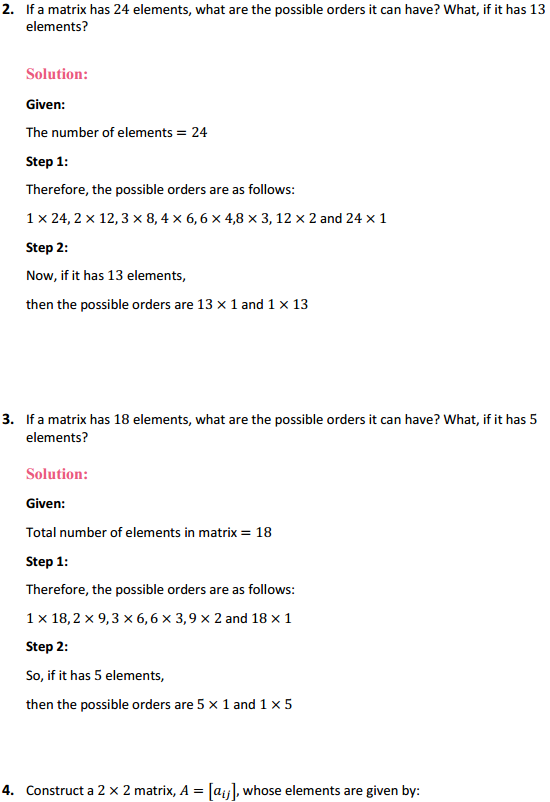

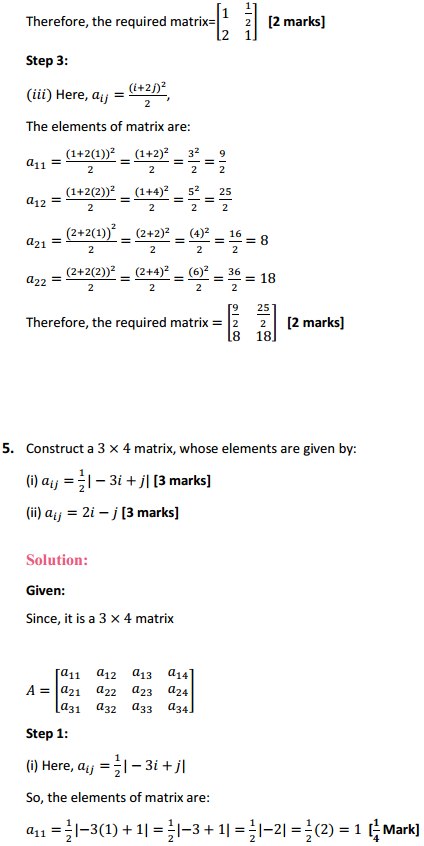




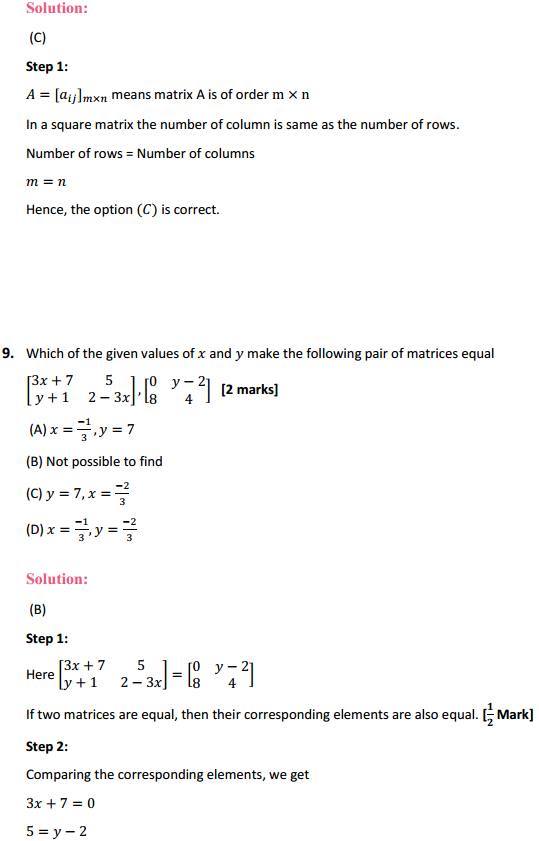
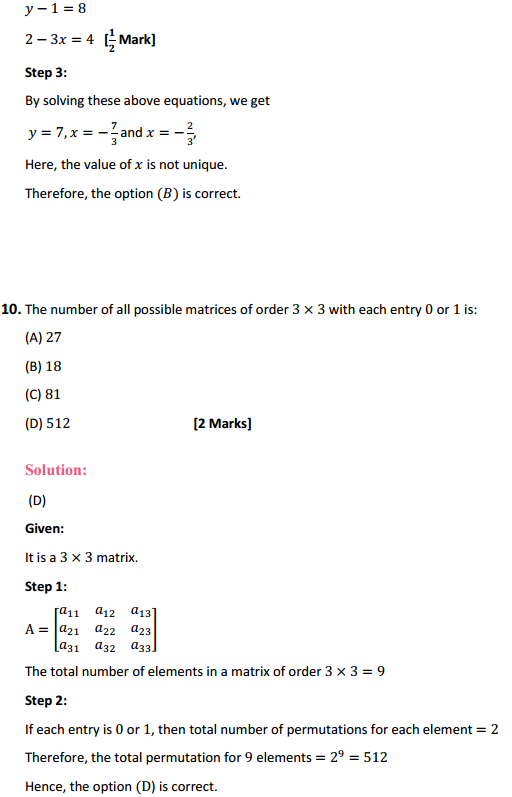
CBSE Class 12
Access Class 12 Maths NCERT Solutions Chapter 3 Matrices Ex 3.1, contains solutions for all Exercise 3.1 Class 12 questions.










Access Class 12 Maths NCERT Solutions Chapter 2 Inverse Trigonometric Functions Miscellaneous Exercise, contains solutions for all Inverse Trigonometric Functions Miscellaneous Exercise Class 12 questions.
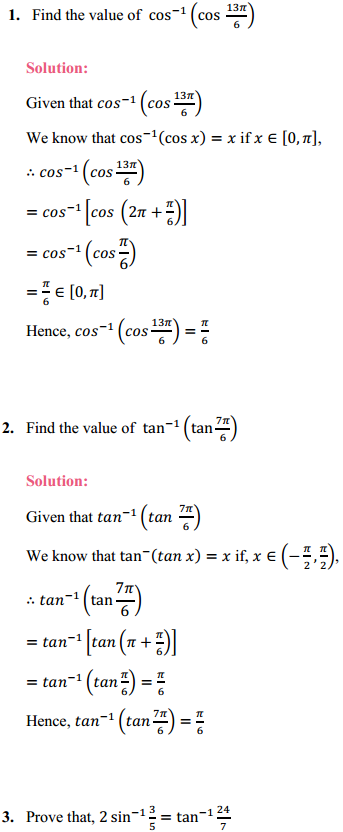

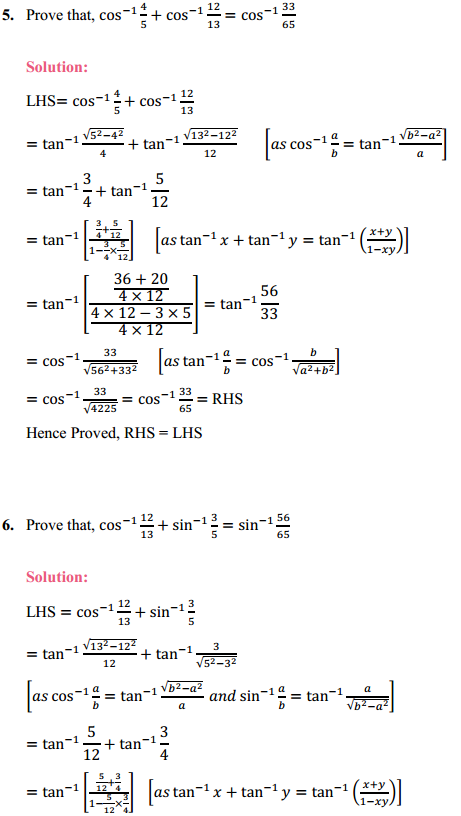
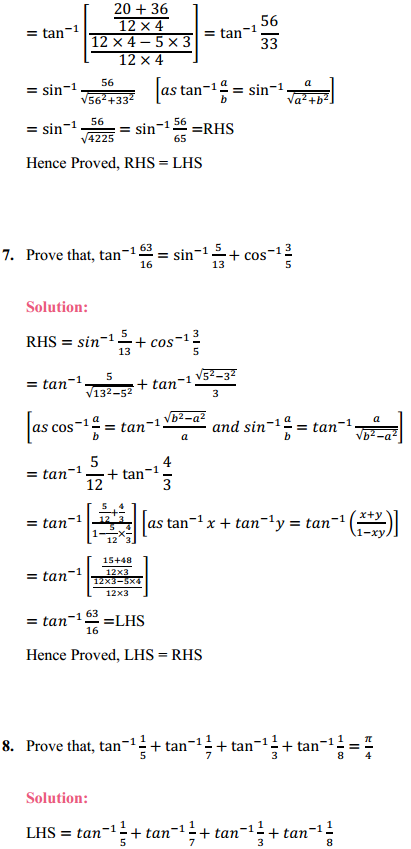


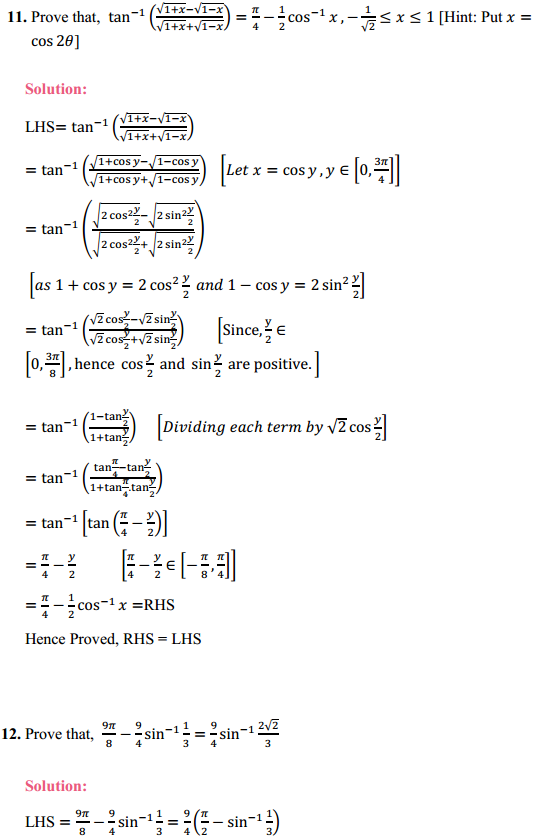


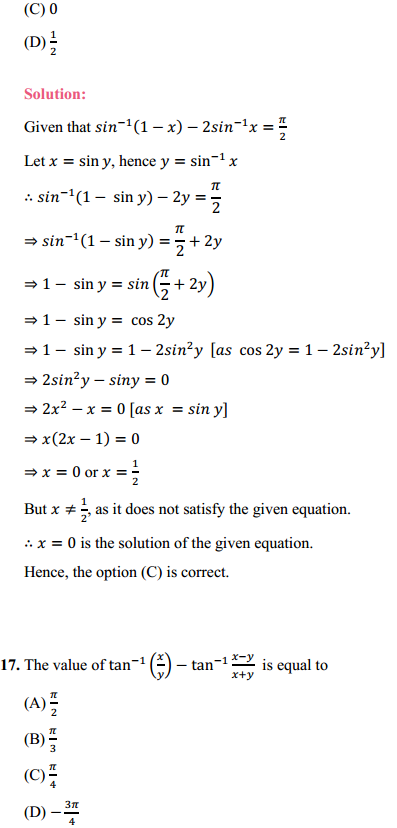

Access Class 12 Maths NCERT Solutions Chapter 2 Inverse Trigonometric Functions Ex 2.2, contains solutions for all Exercise 2.2 Class 12 questions.

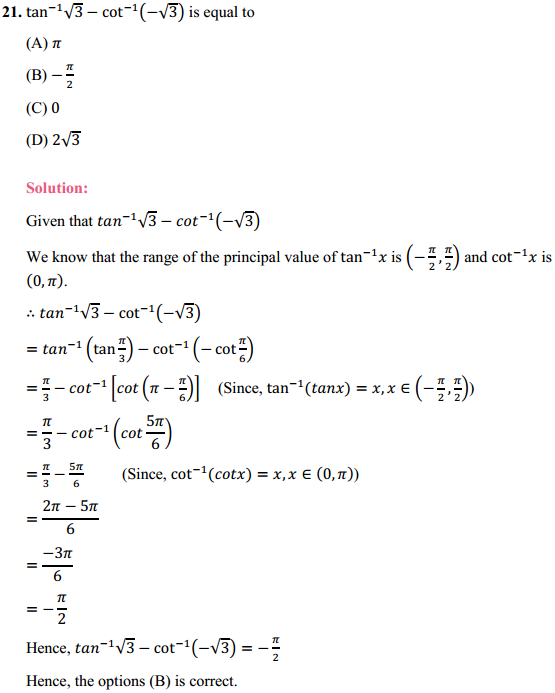
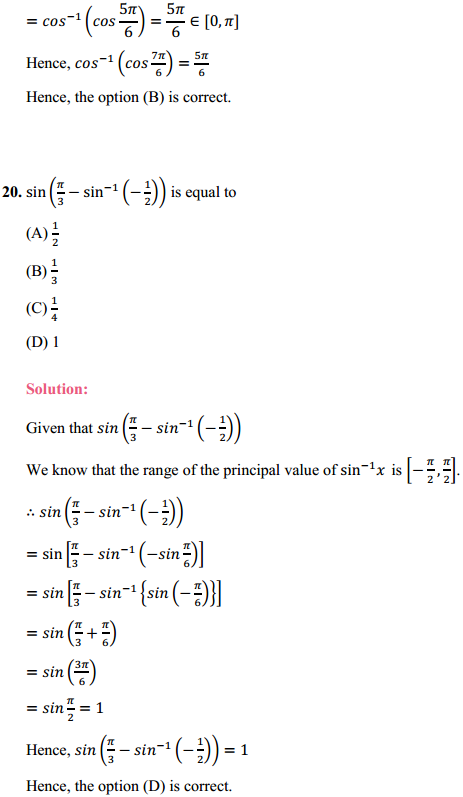



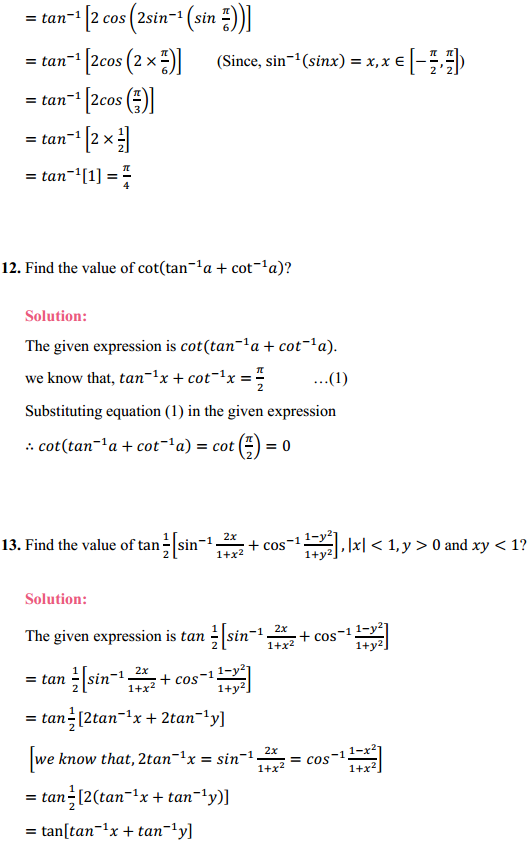

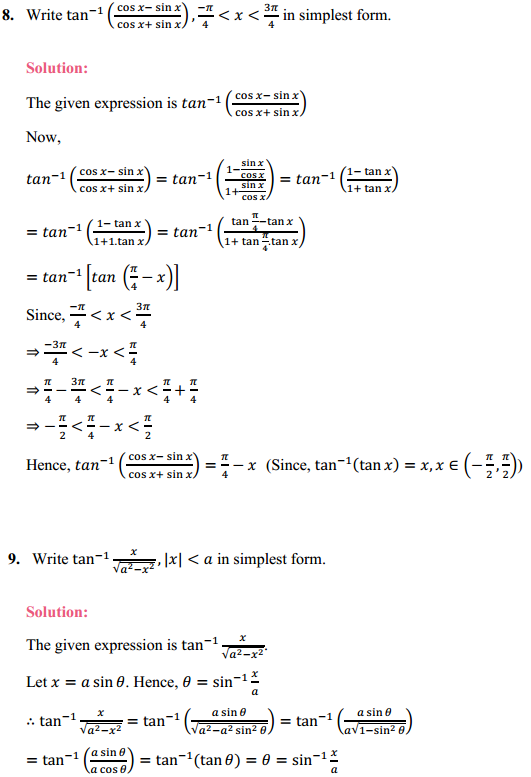

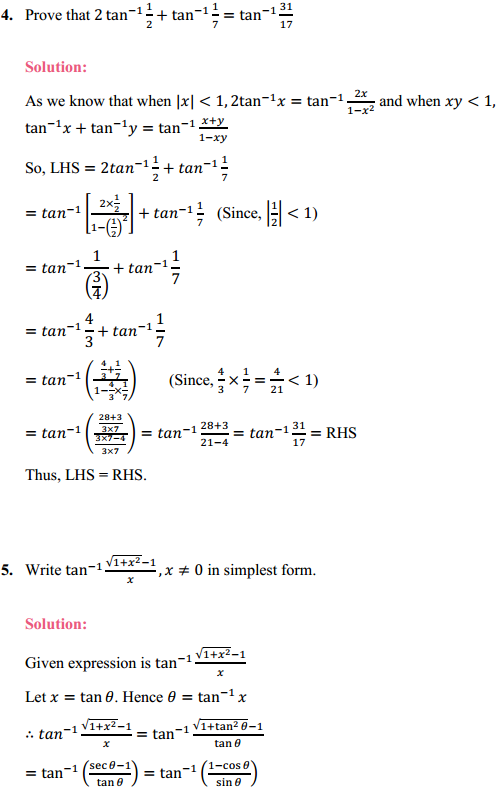
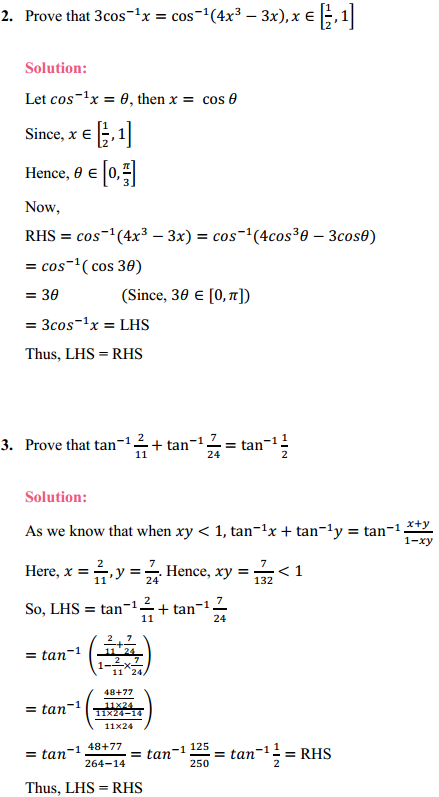
Access Class 12 Maths NCERT Solutions Chapter 2 Inverse Trigonometric Functions Ex 2.1, contains solutions for all Exercise 2.1 Class 12 questions.



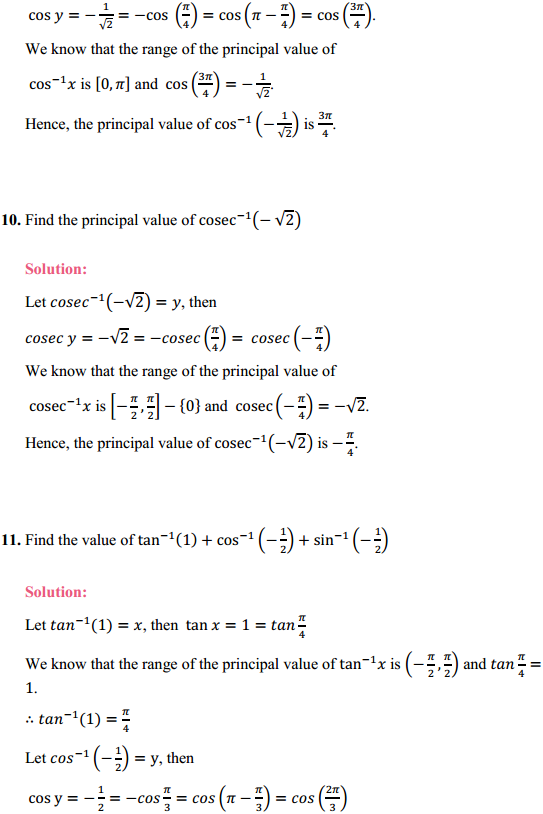


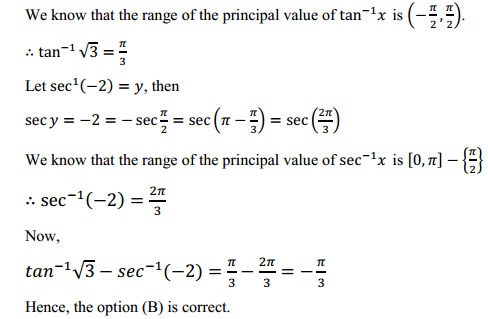
Access Class 12 Maths NCERT Solutions Chapter 1 Relations and Functions Miscellaneous Exercise, contains solutions for all Miscellaneous Exercise Class 12 questions.
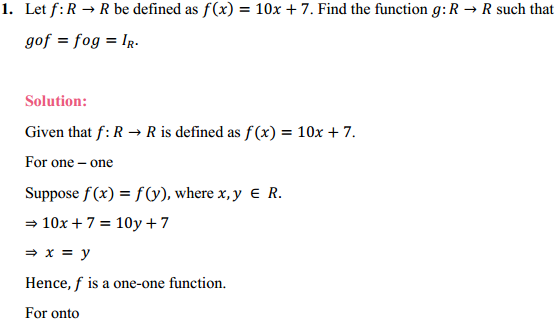
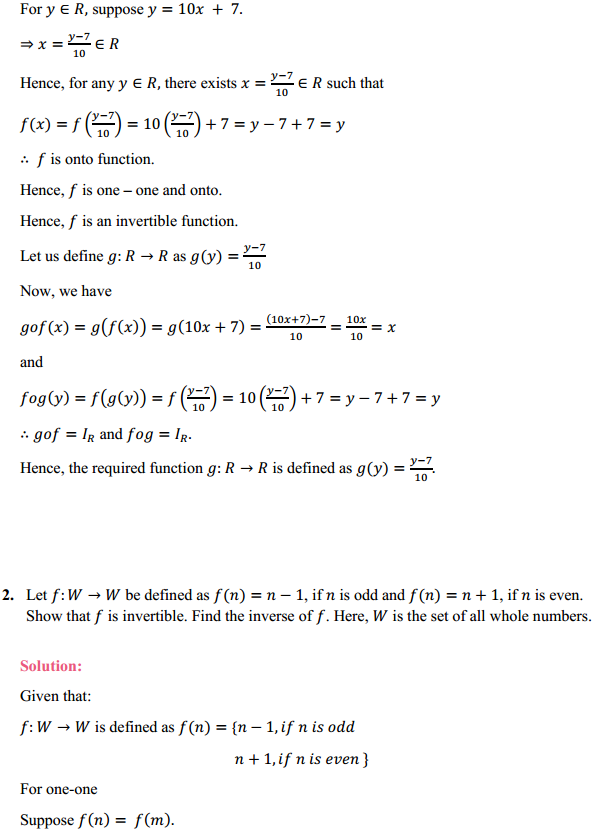
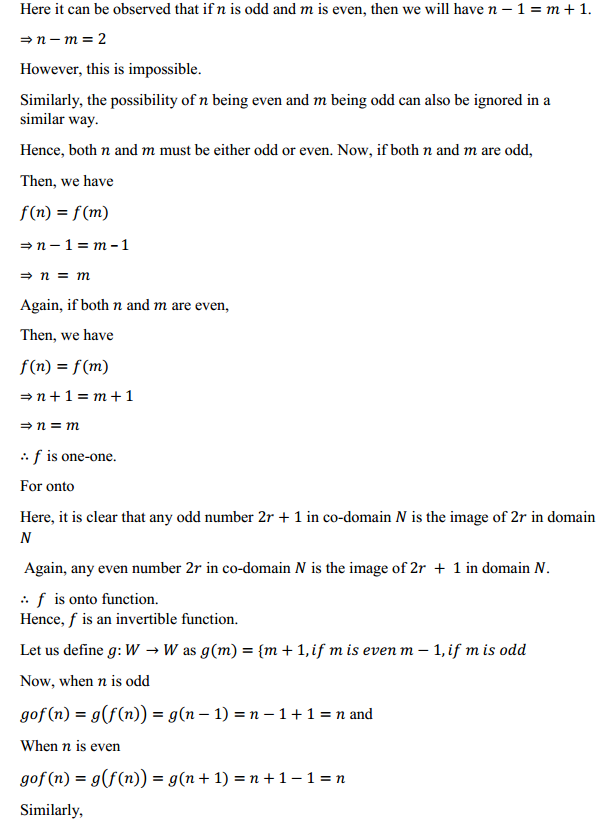

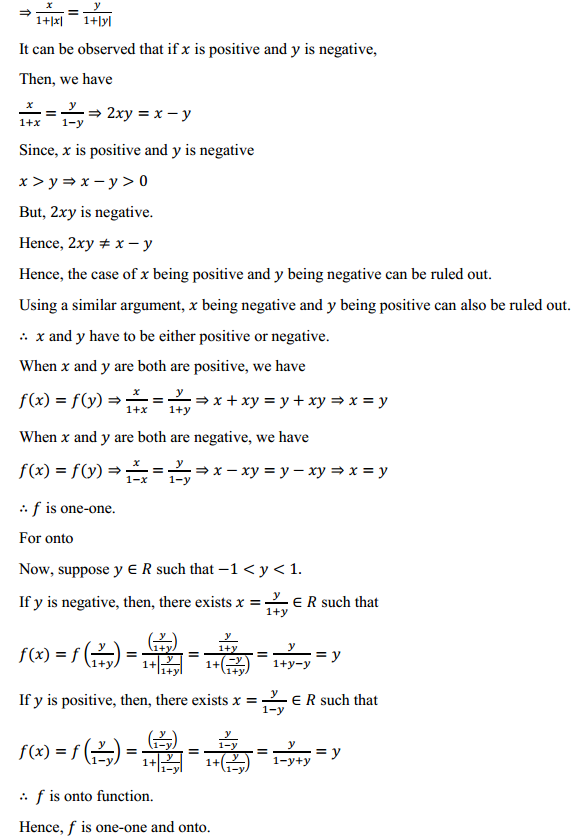
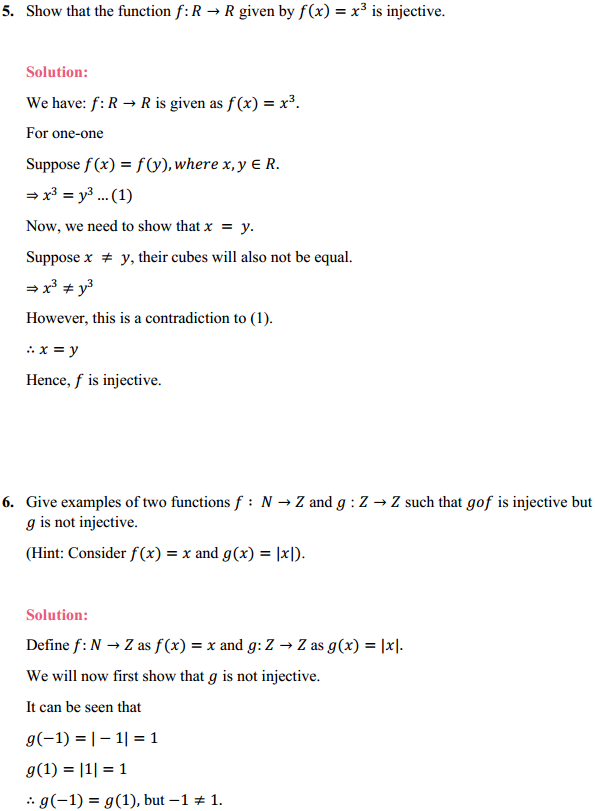
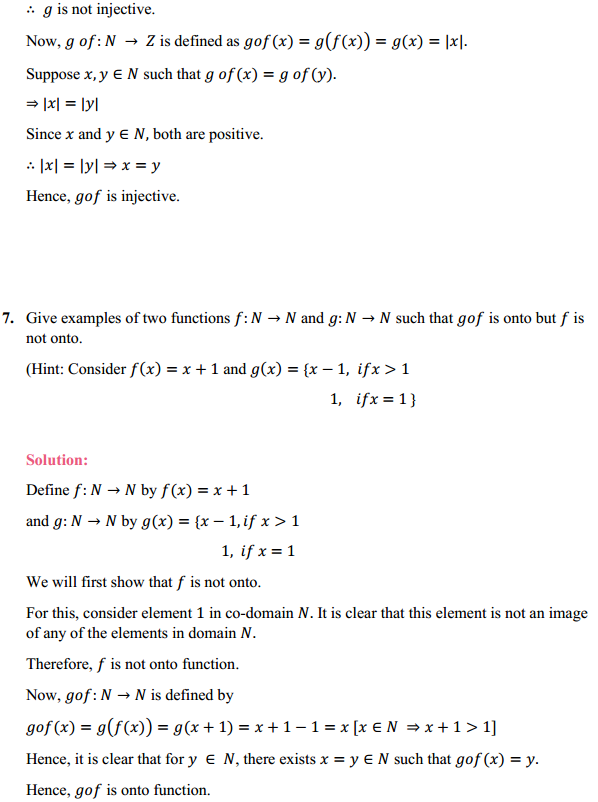
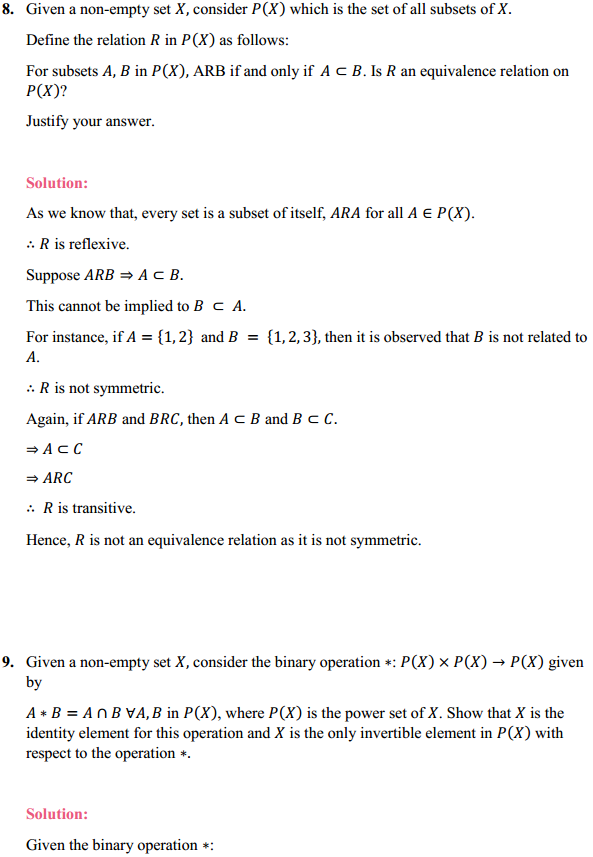
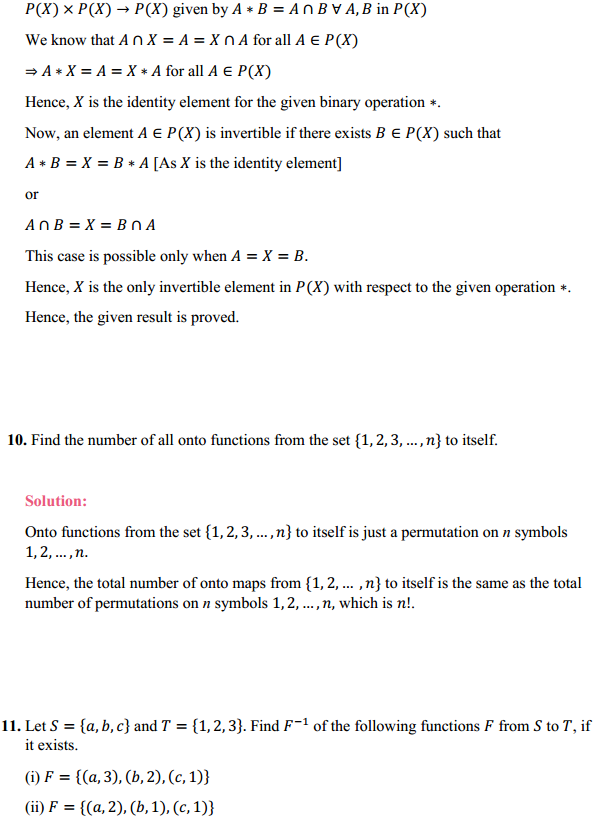
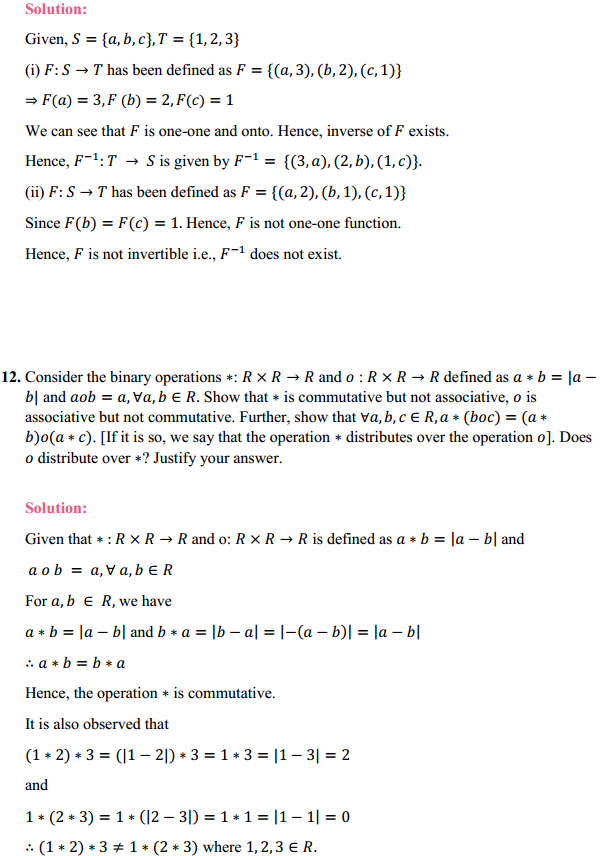
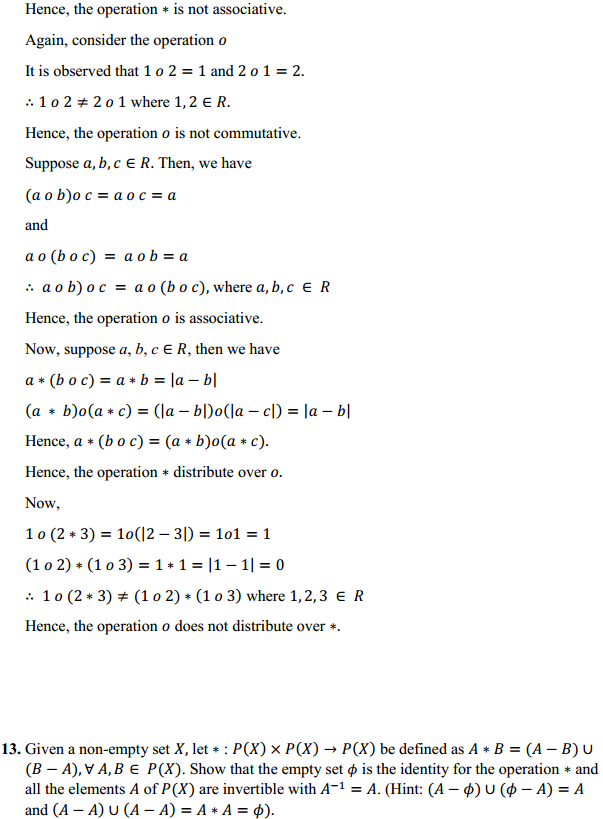
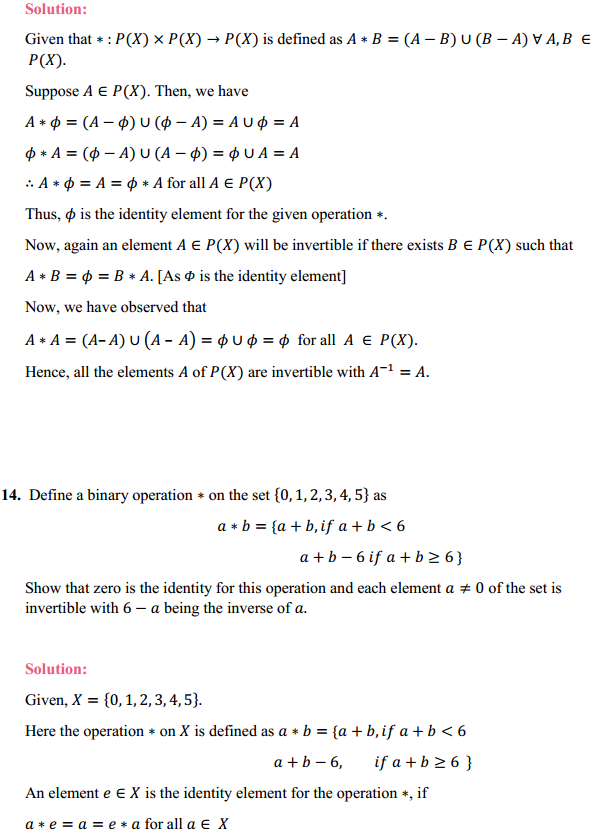
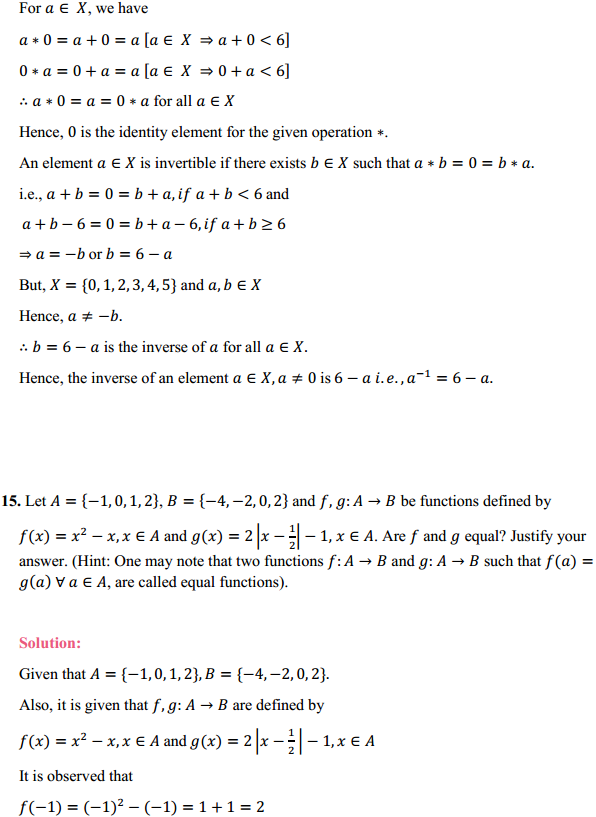
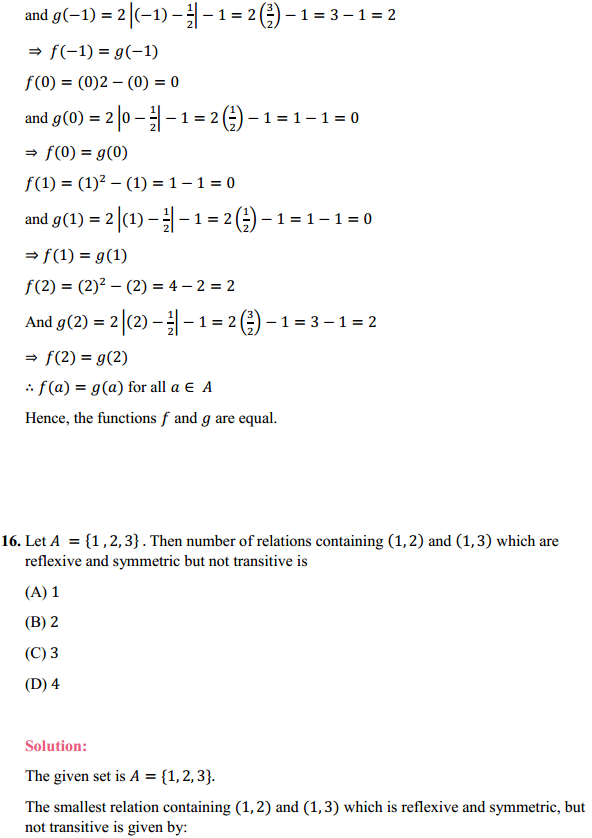
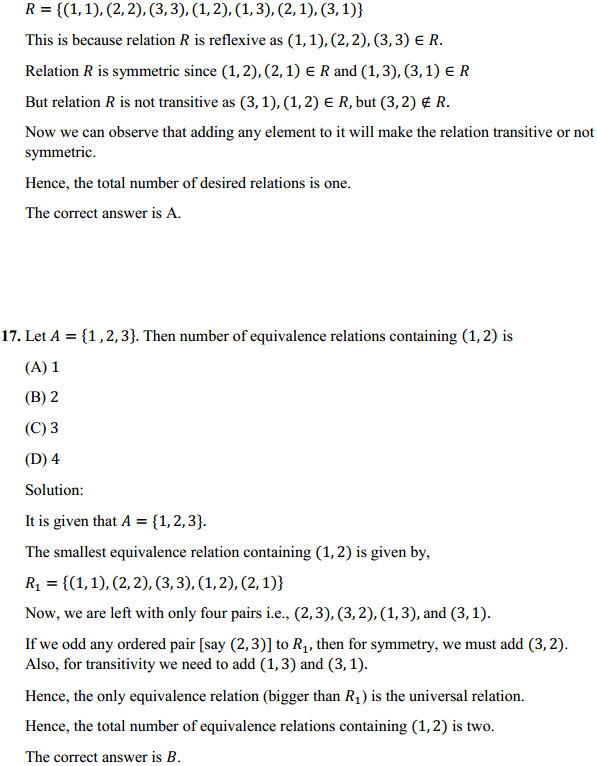
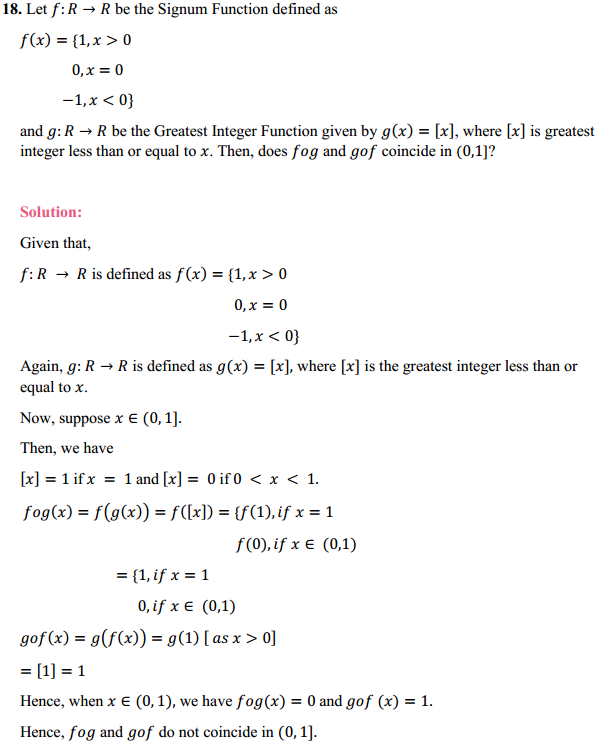
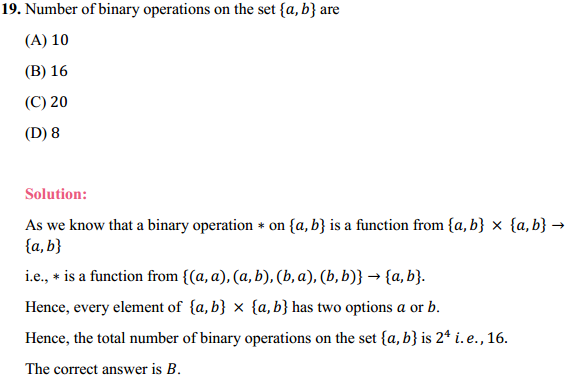
Access Class 12 Maths NCERT Solutions Chapter 1 Relations and Functions Ex 1.4, contains solutions for all Exercise 1.4 Class 12 questions.
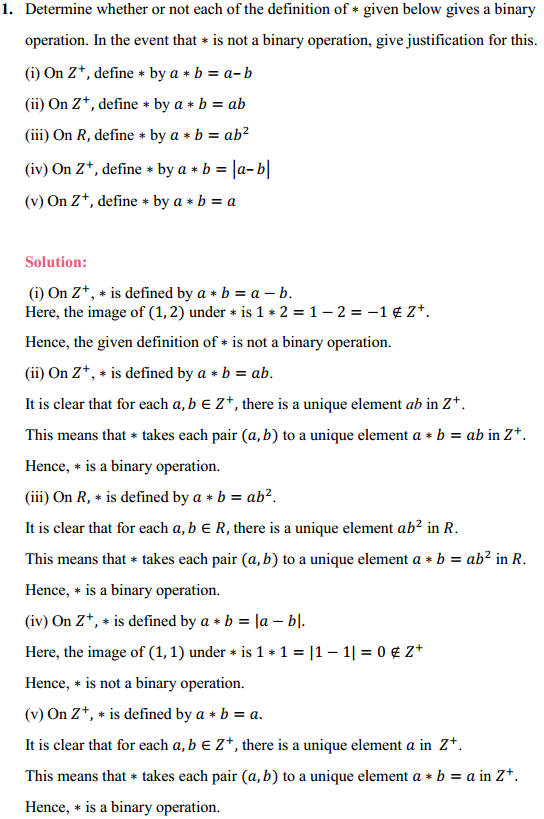
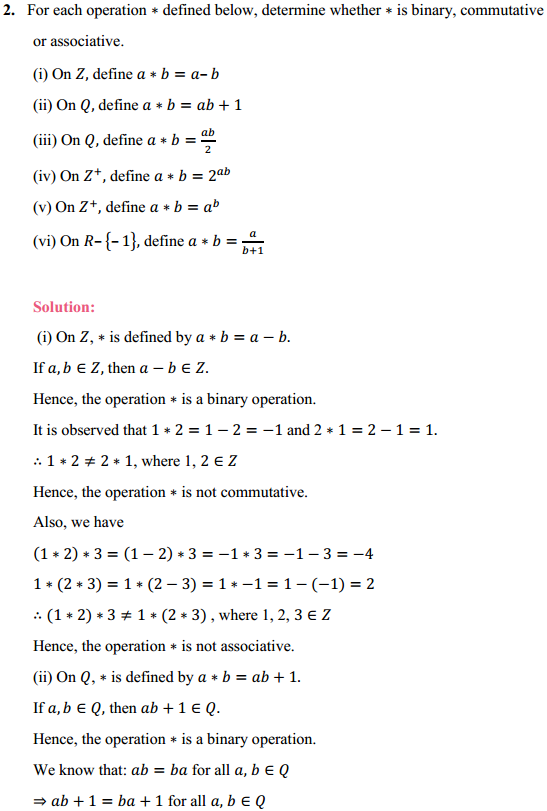
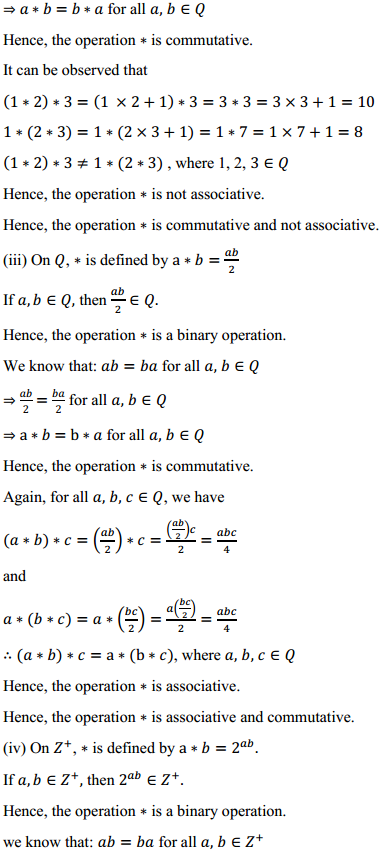
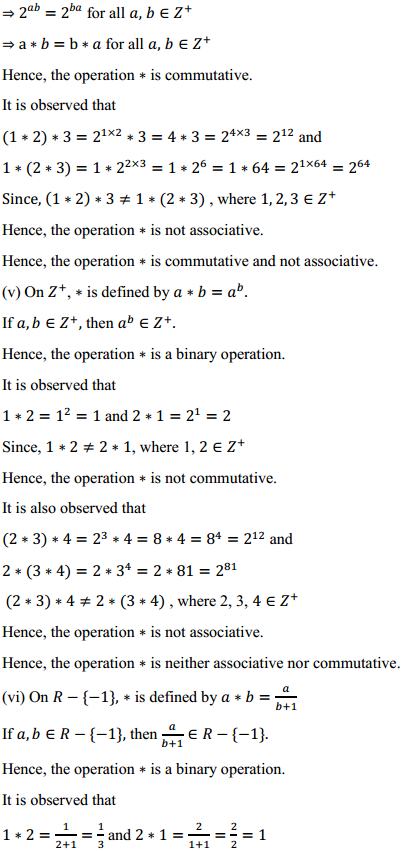
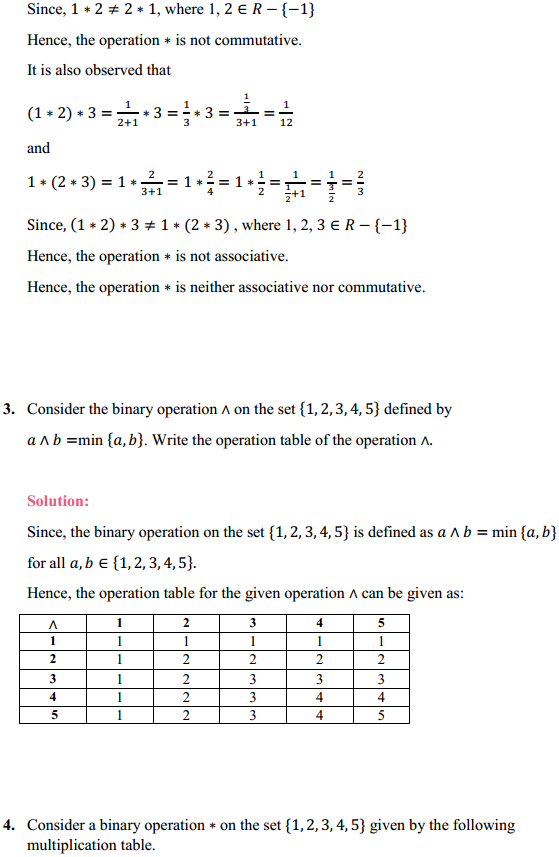
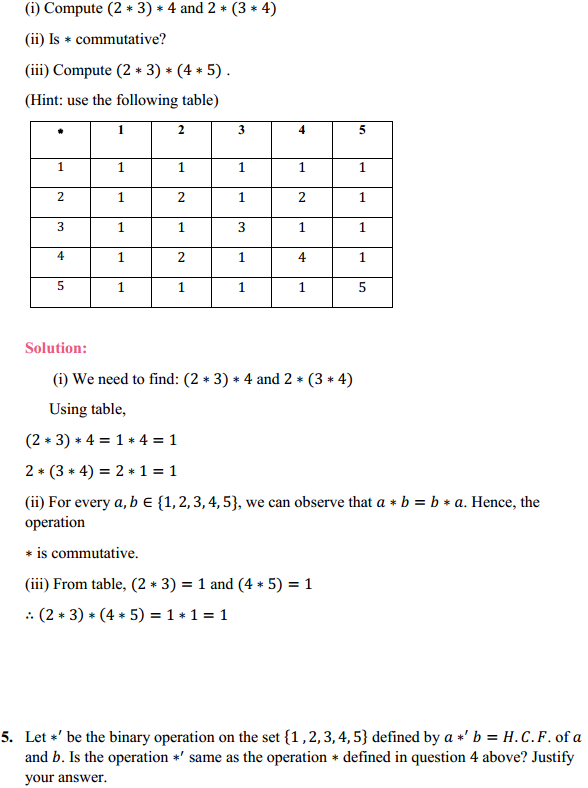
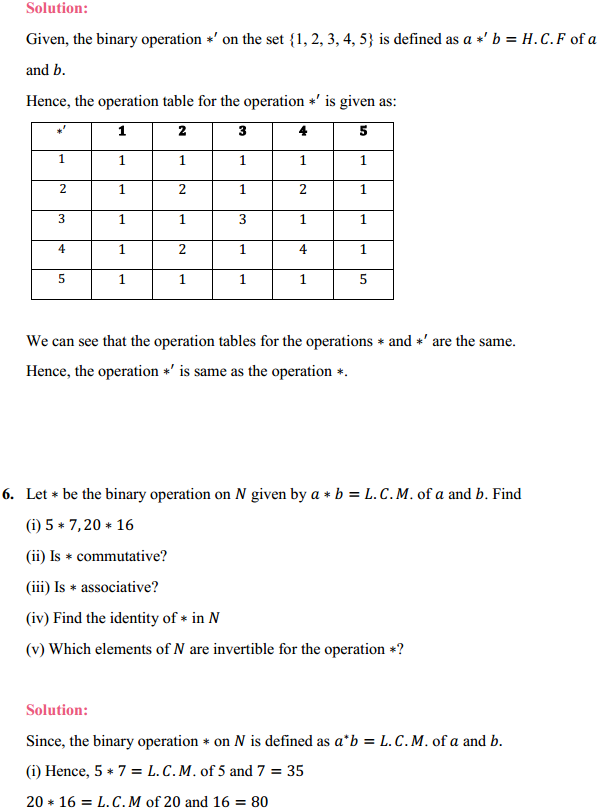
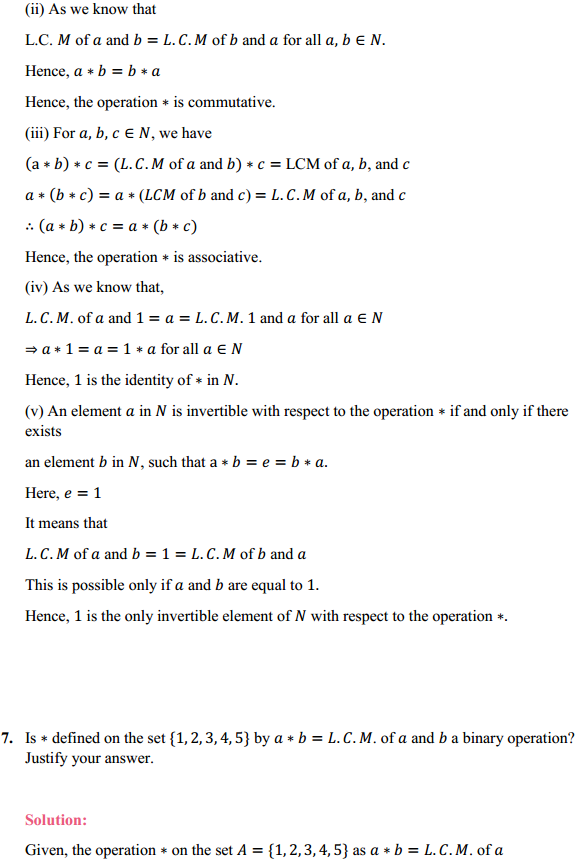
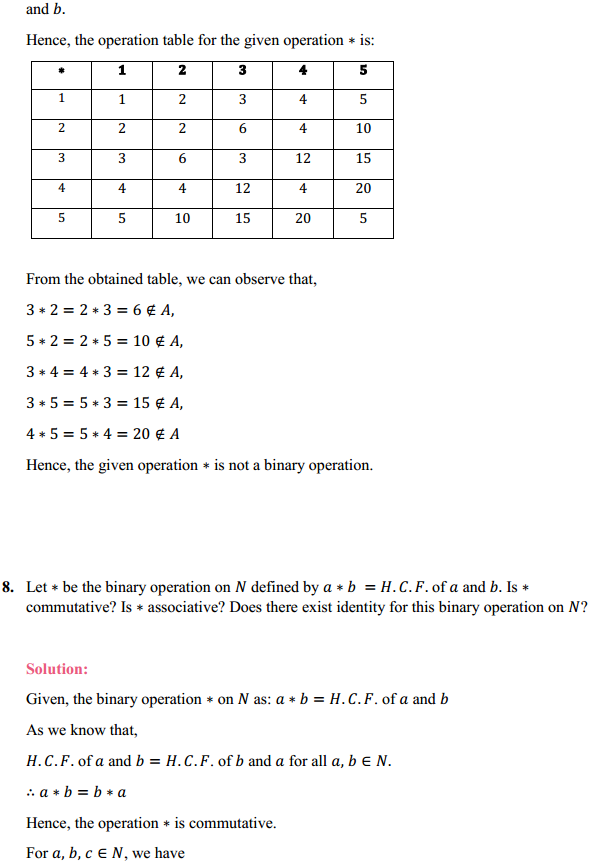
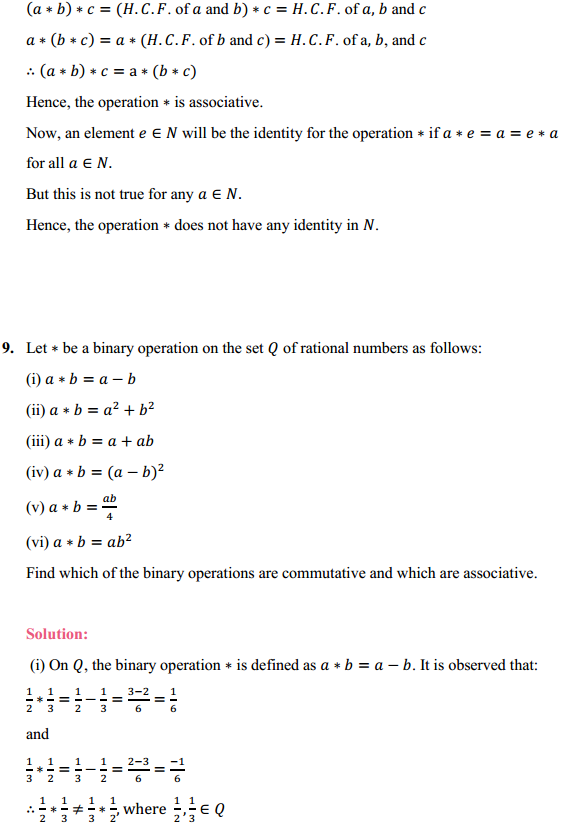
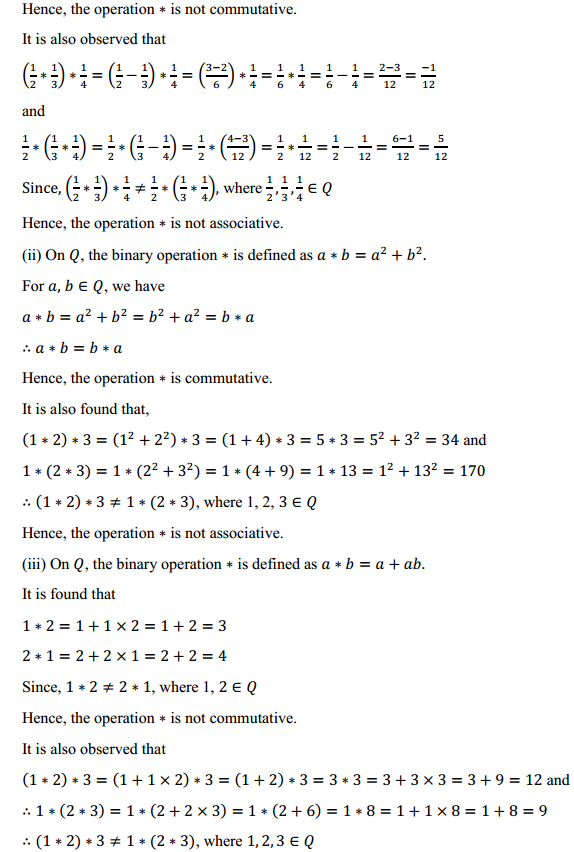
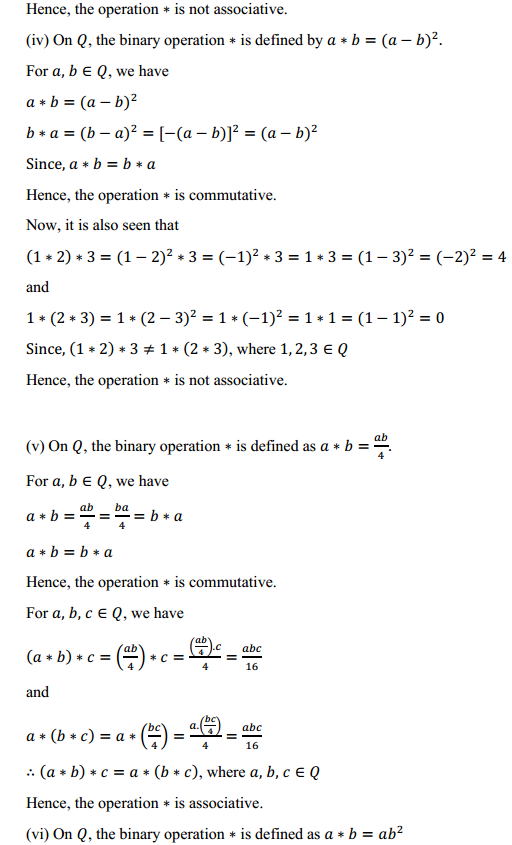
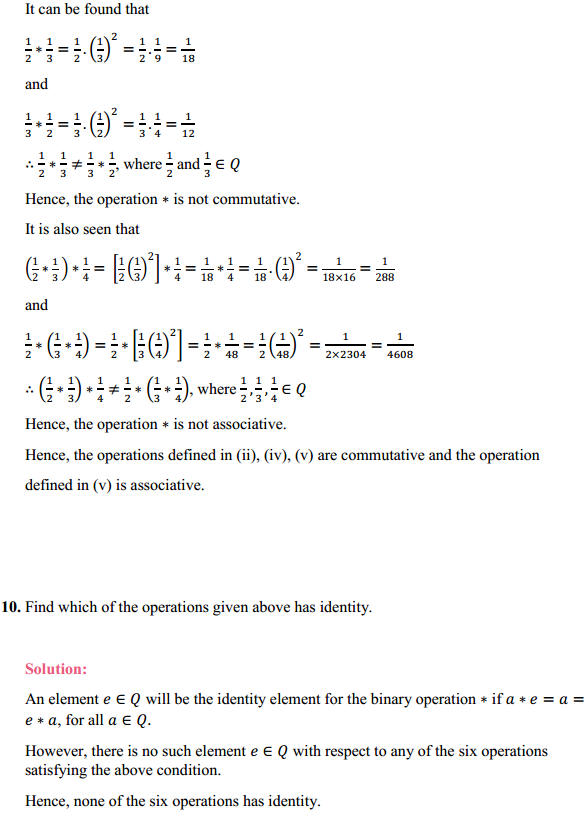
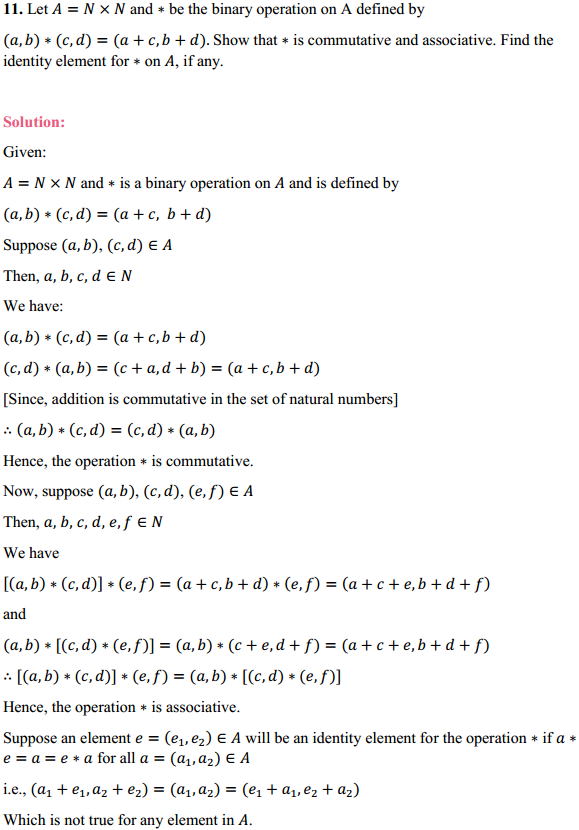
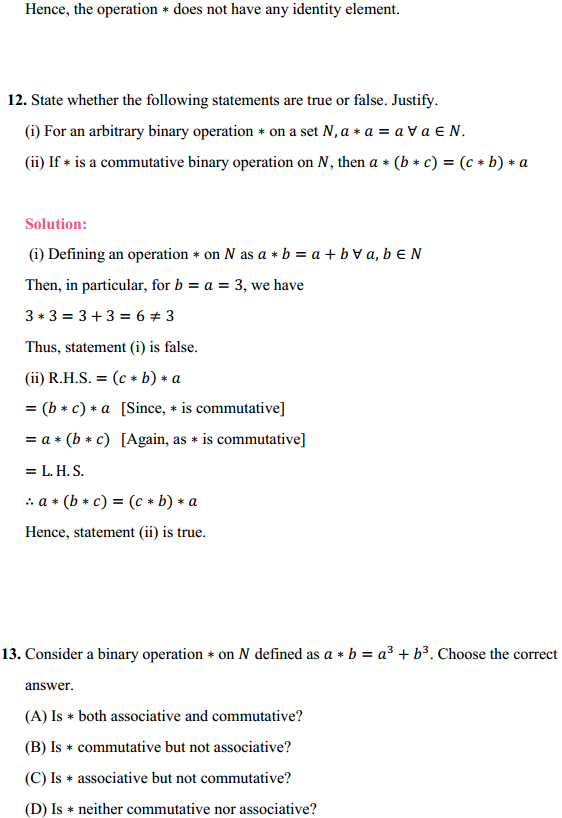
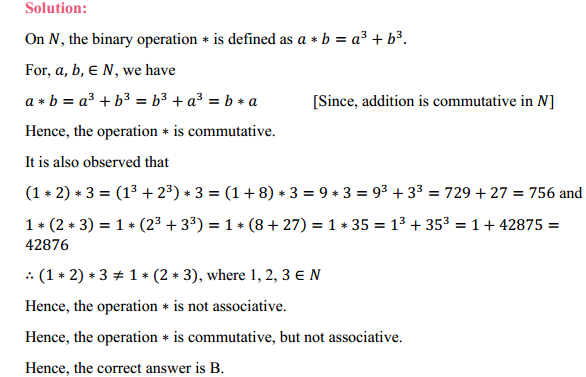
Access Class 12 Maths NCERT Solutions Chapter 1 Relations and Functions Ex 1.3, contains solutions for all Exercise 1.3 Class 12 questions.
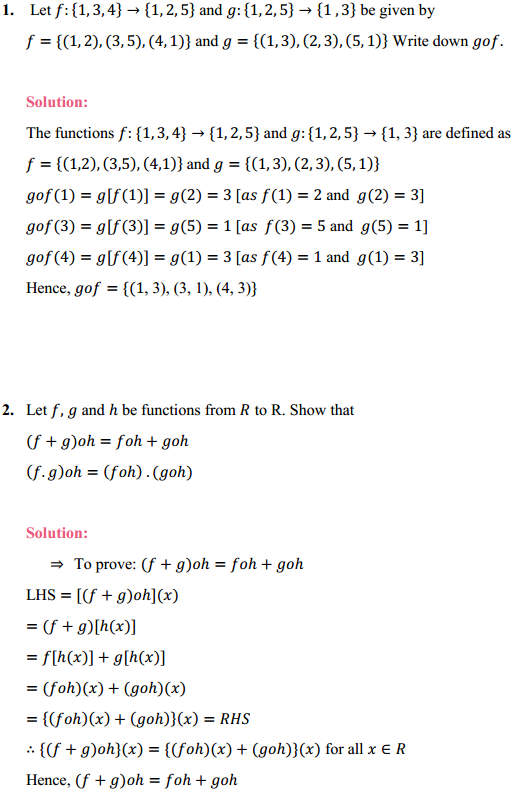

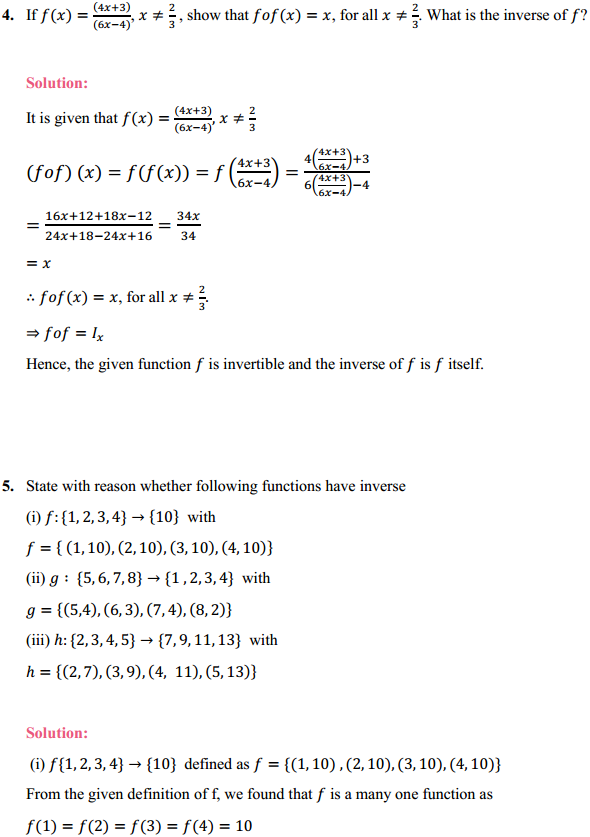
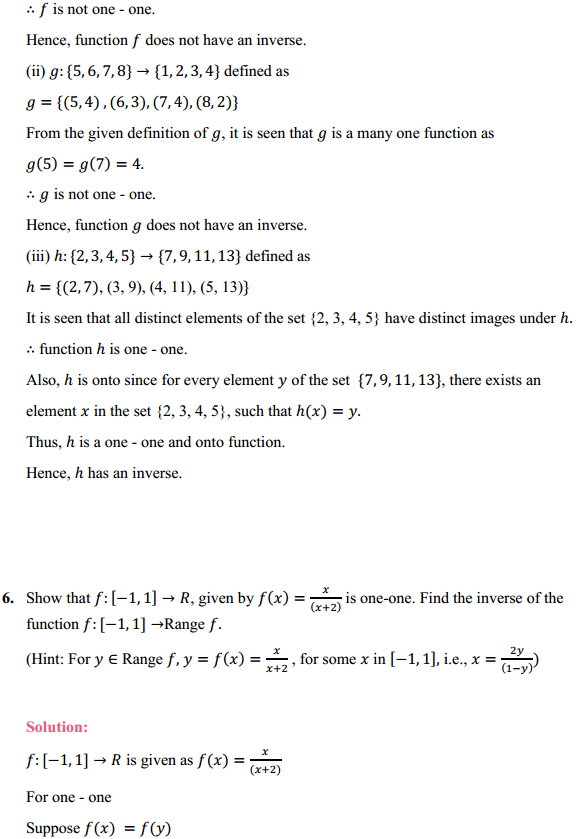

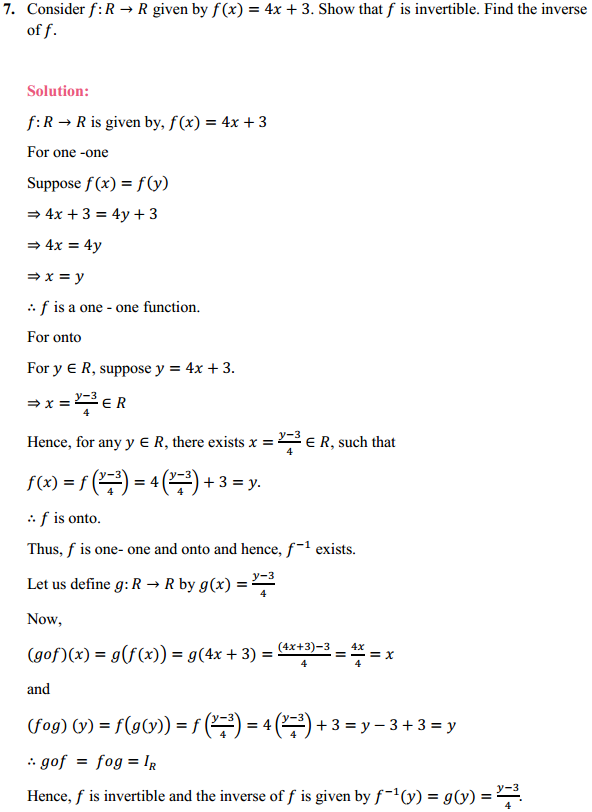
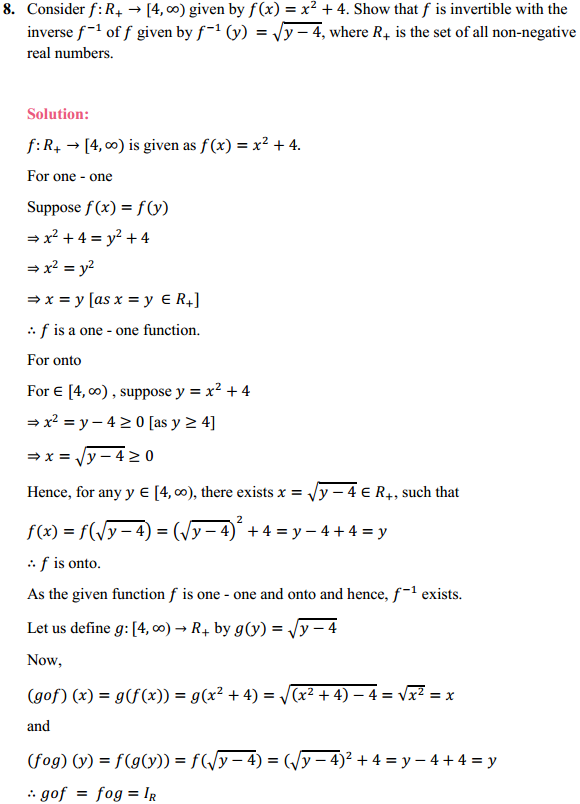
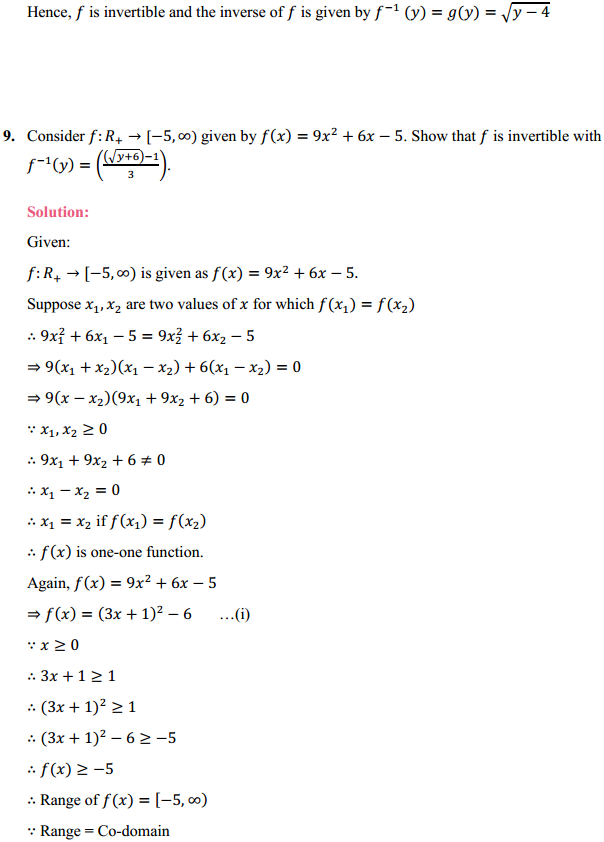
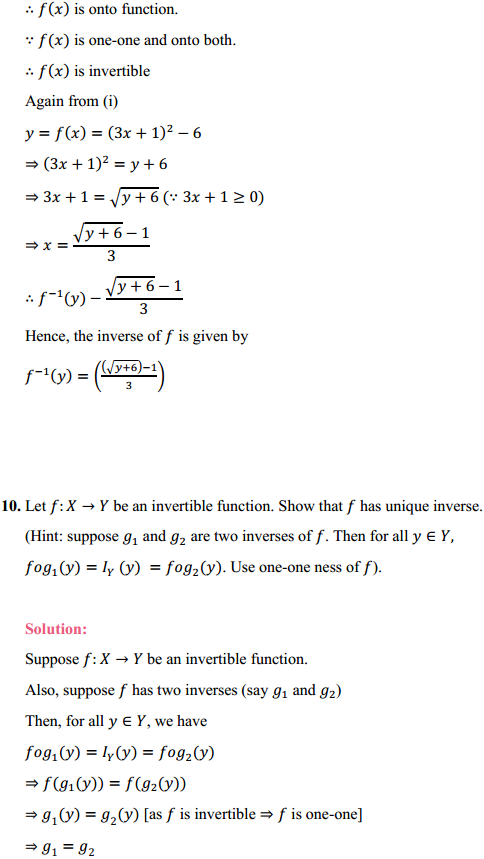
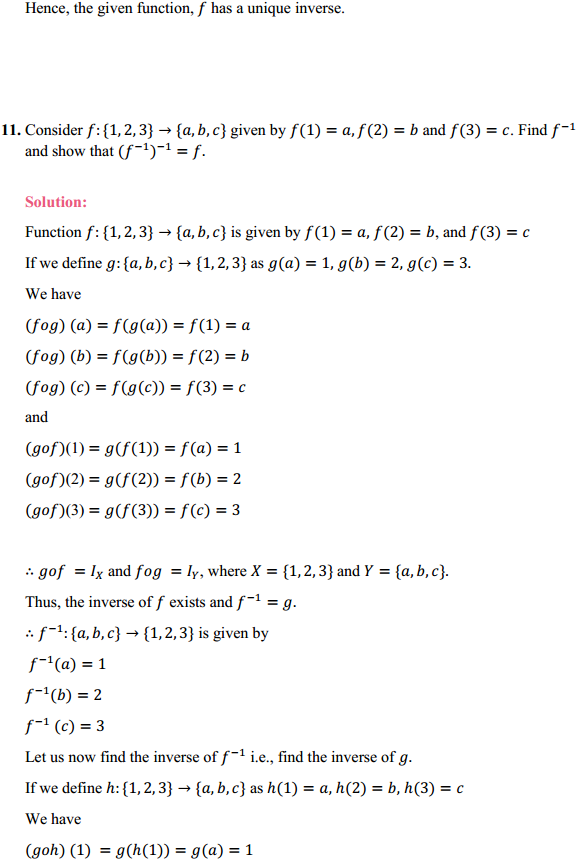
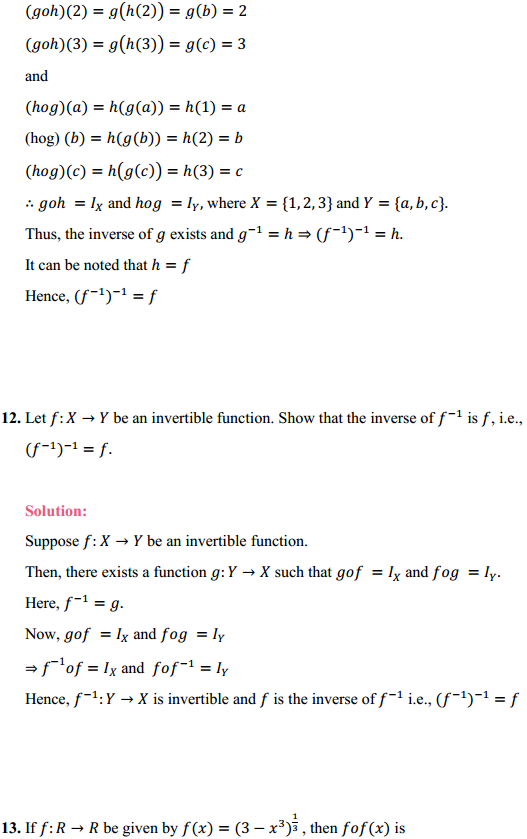
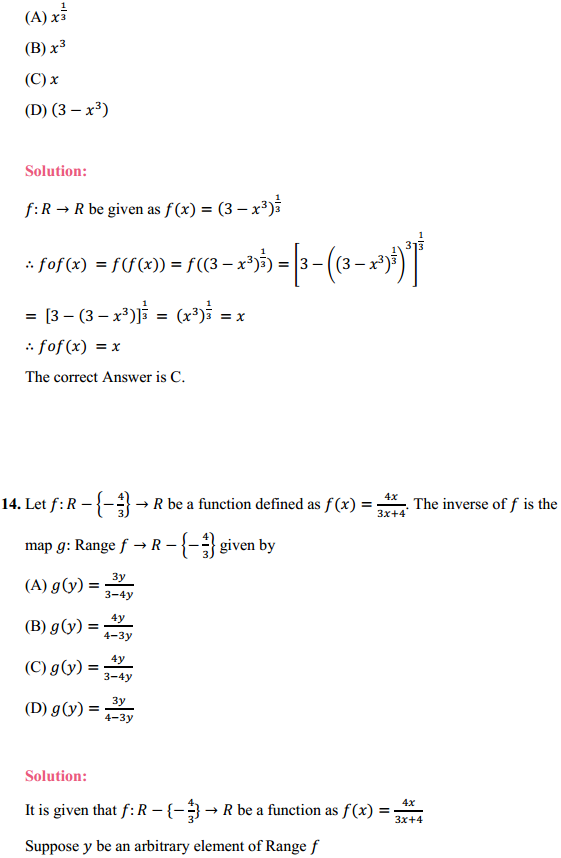
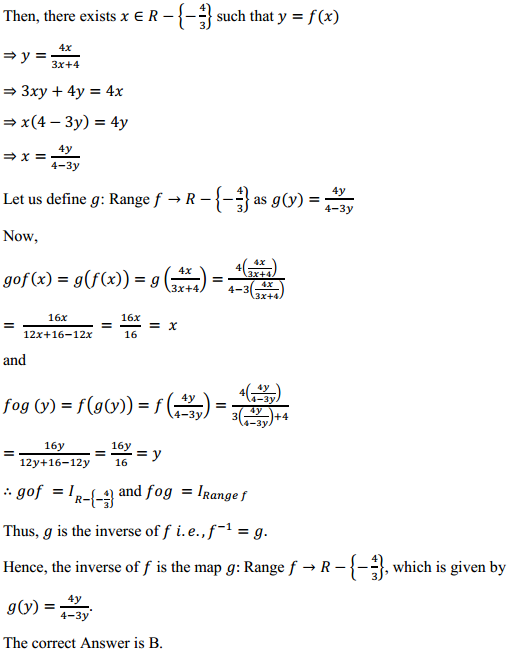
Access Class 12 Maths NCERT Solutions Chapter 1 Relations and Functions Ex 1.2, contains solutions for all Exercise 1.2 Class 12 questions.

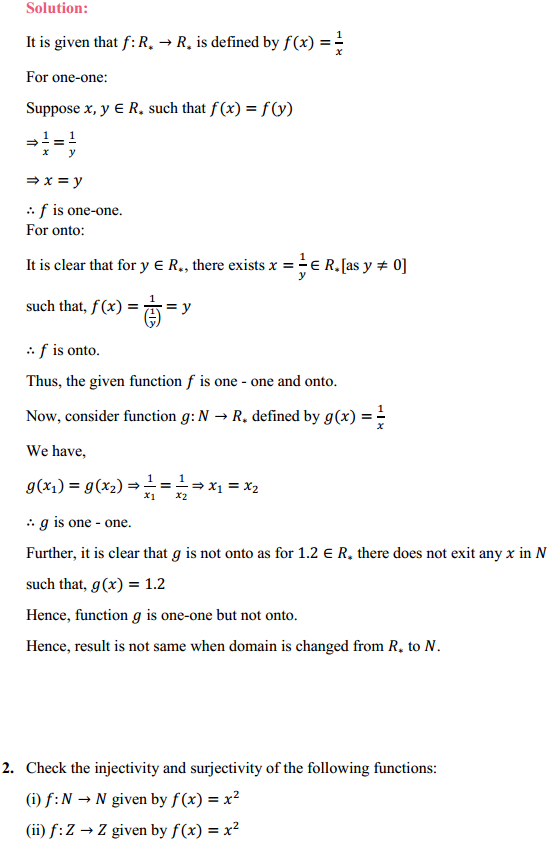
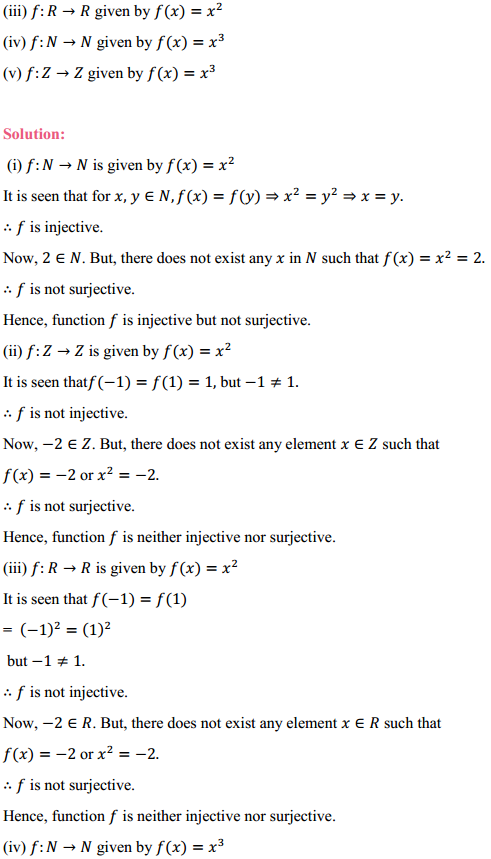
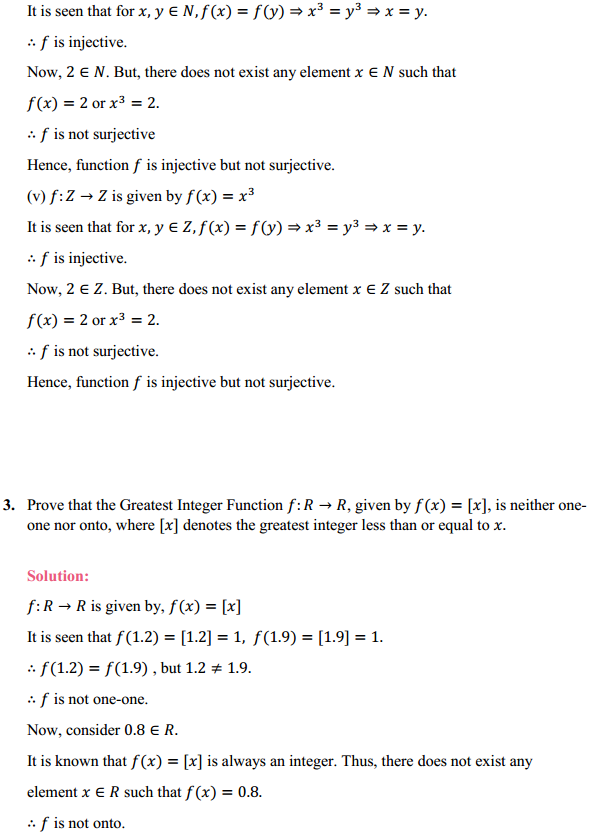
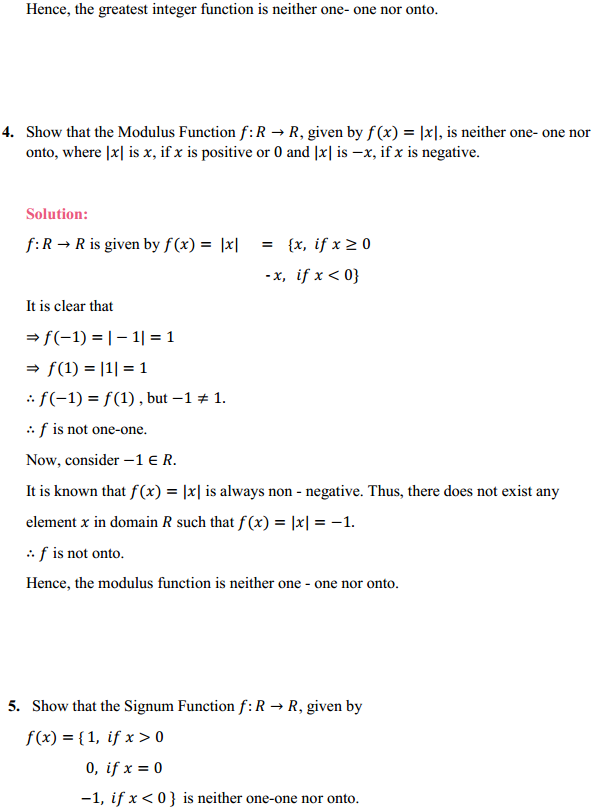
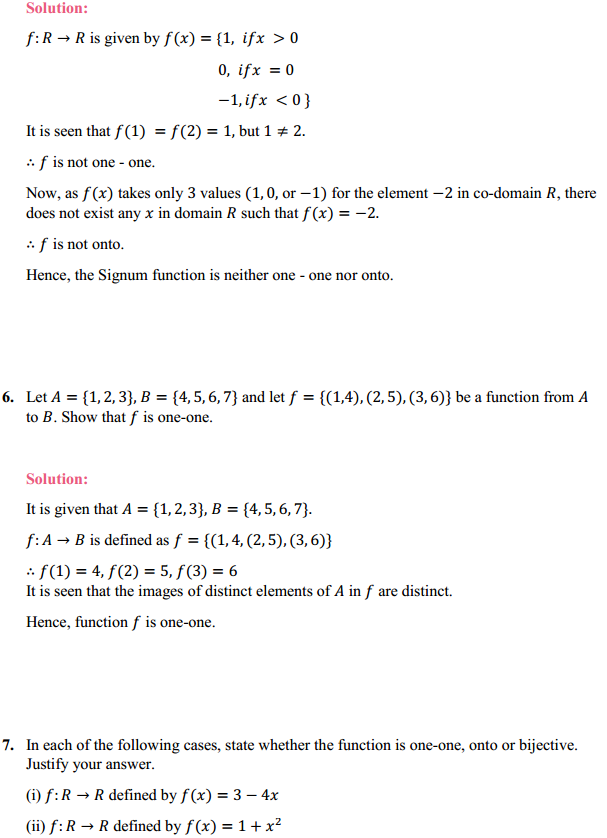
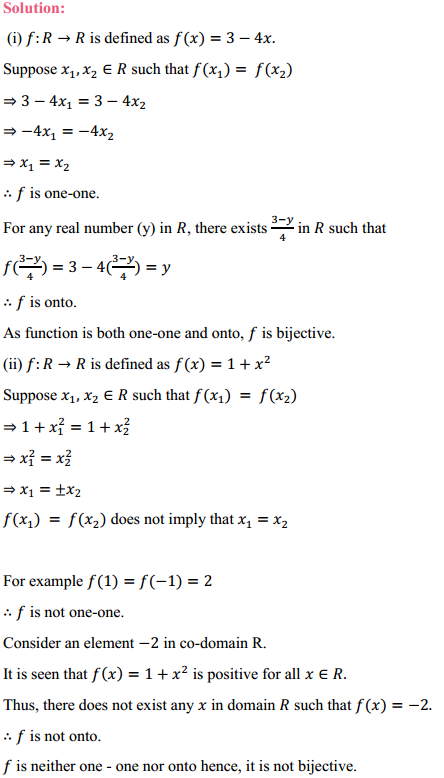
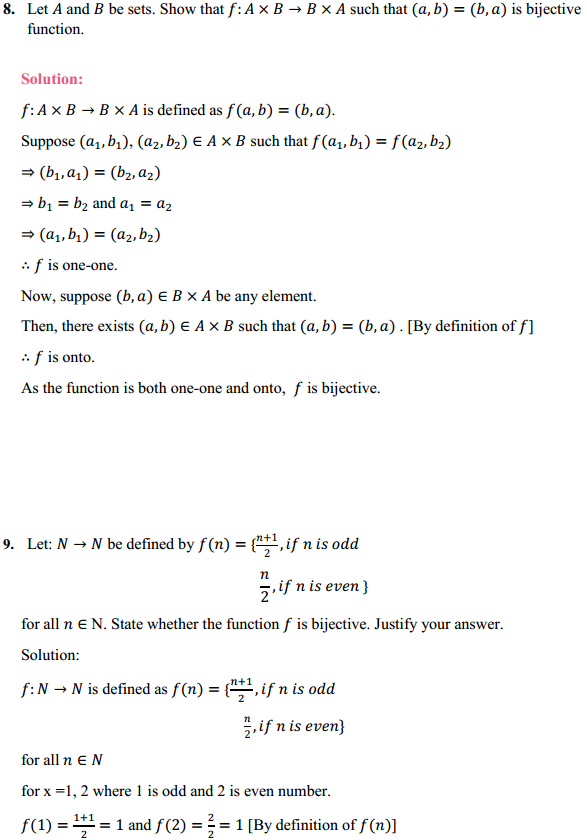
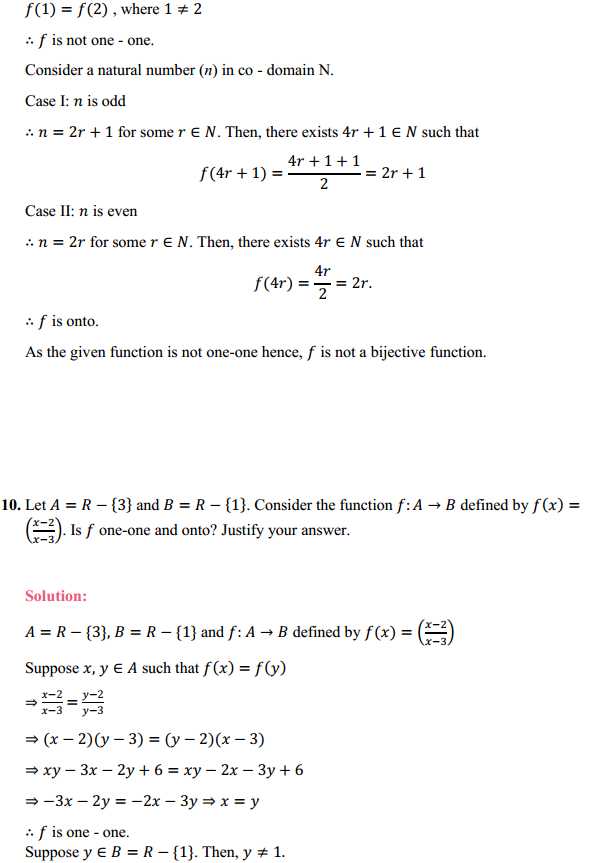
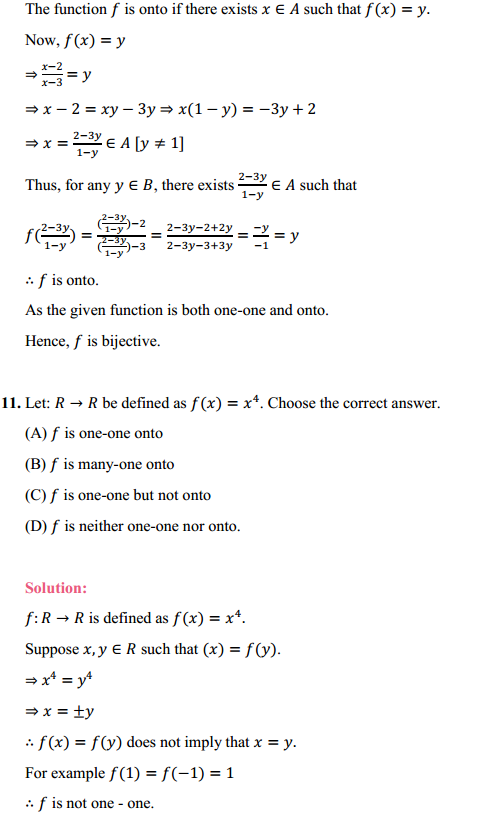
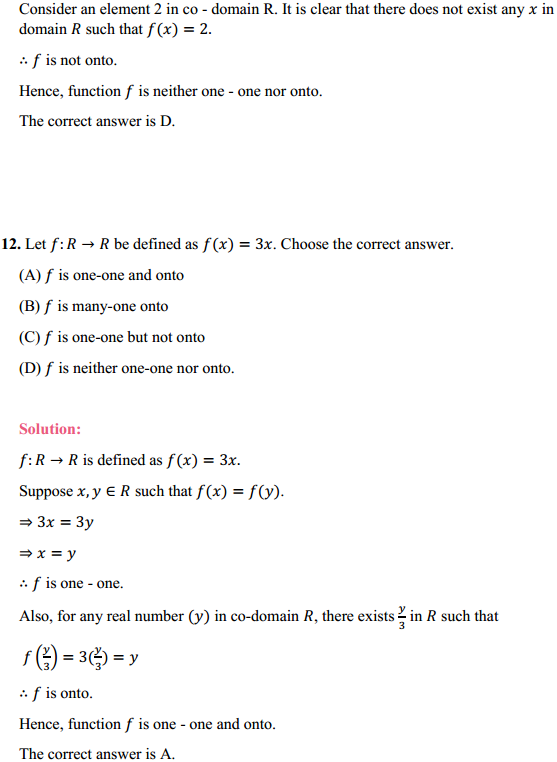
Access Class 12 Maths NCERT Solutions Chapter 1 Relations and Functions Ex 1.1, contains solutions for all Exercise 1.1 Class 12 questions.
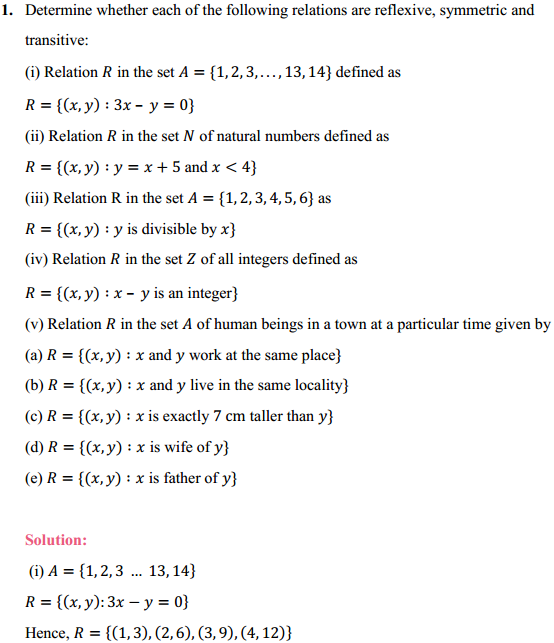
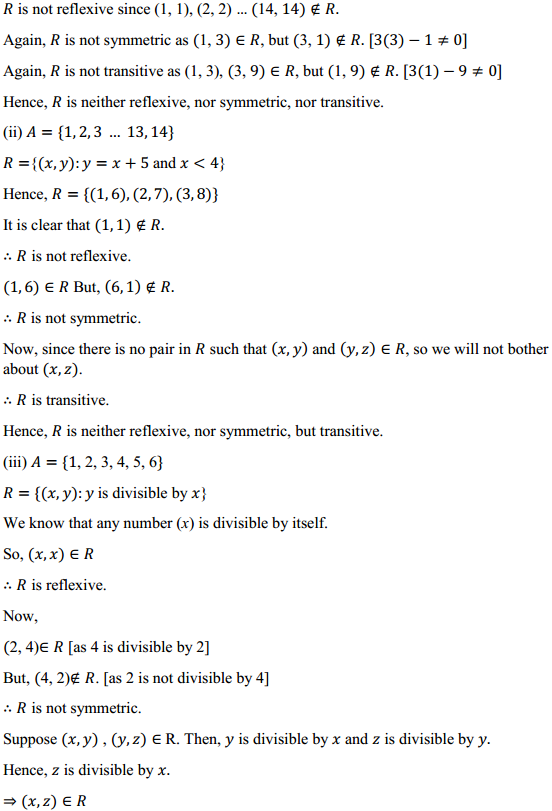
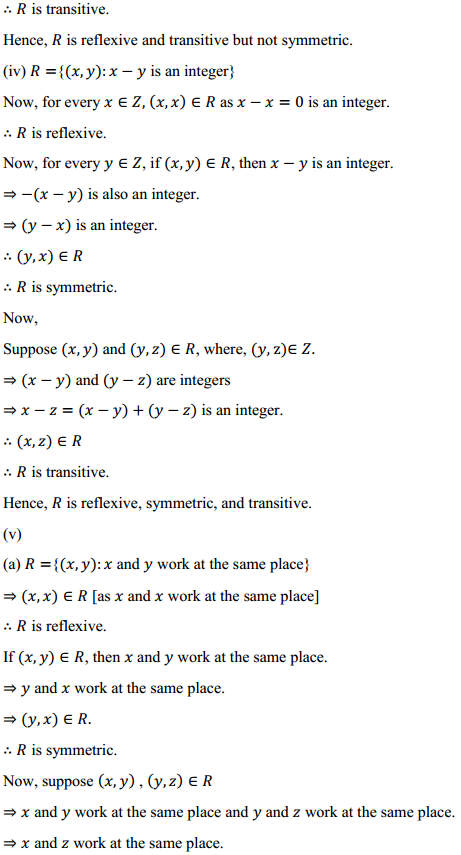
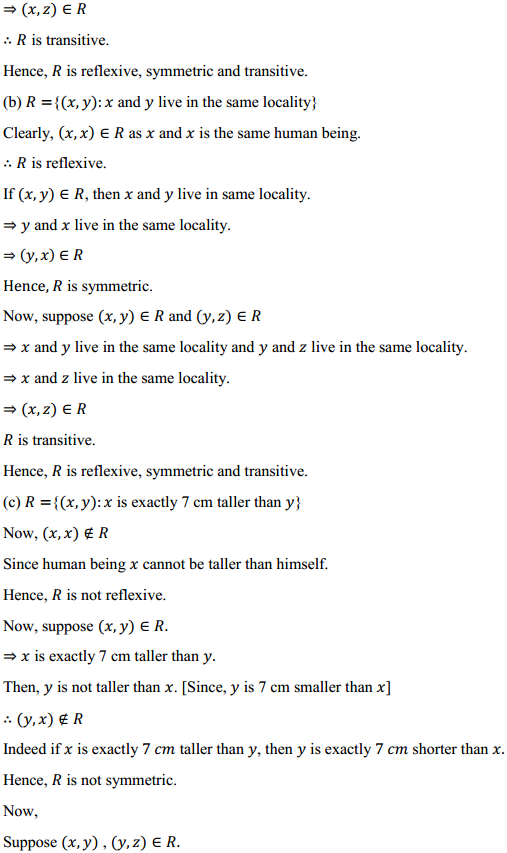
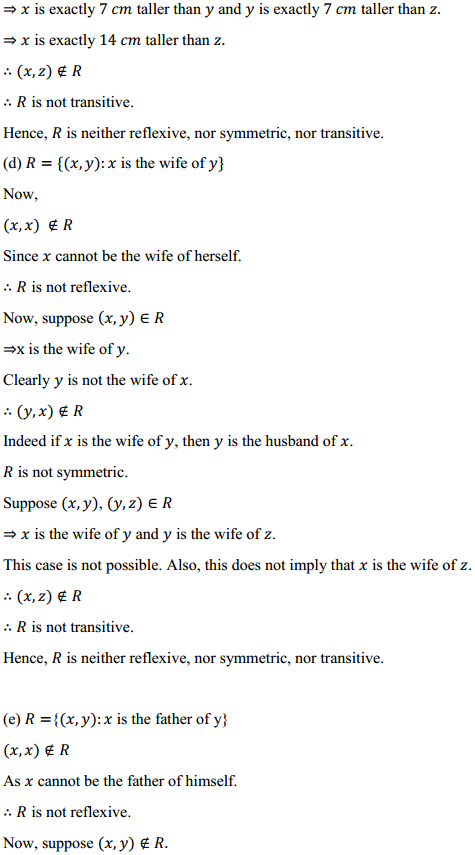
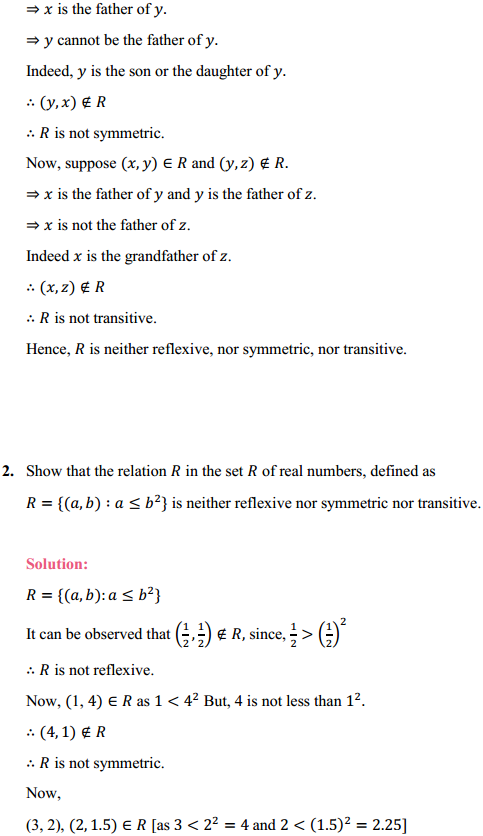
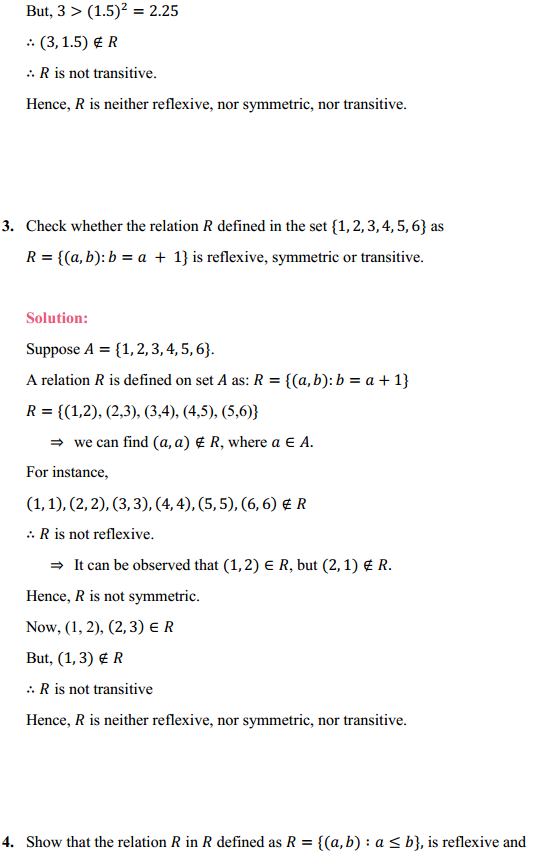
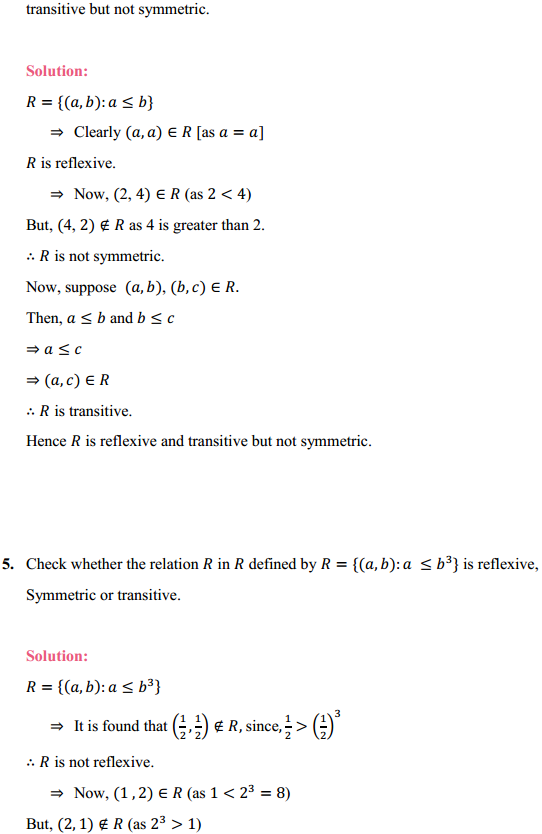
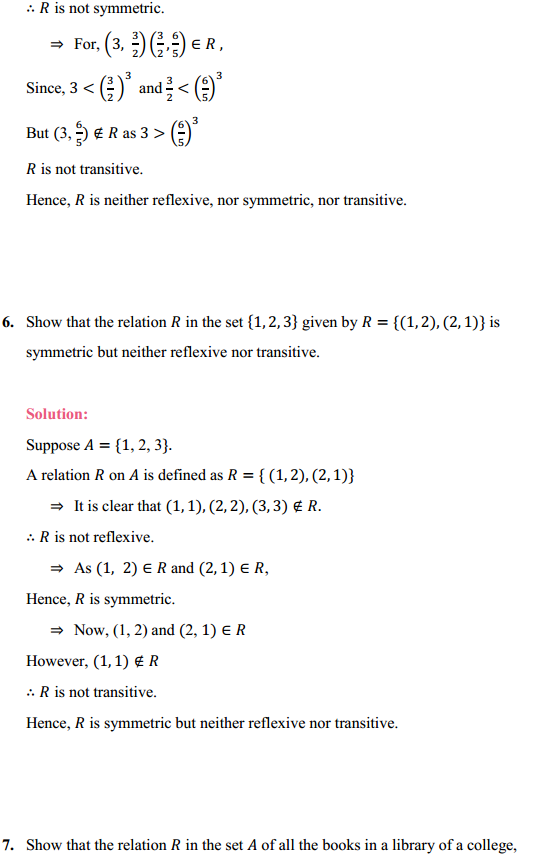
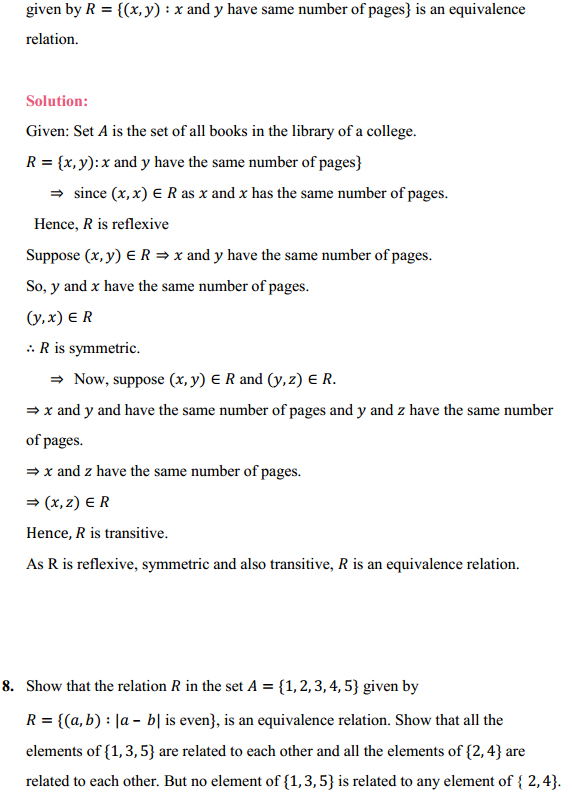
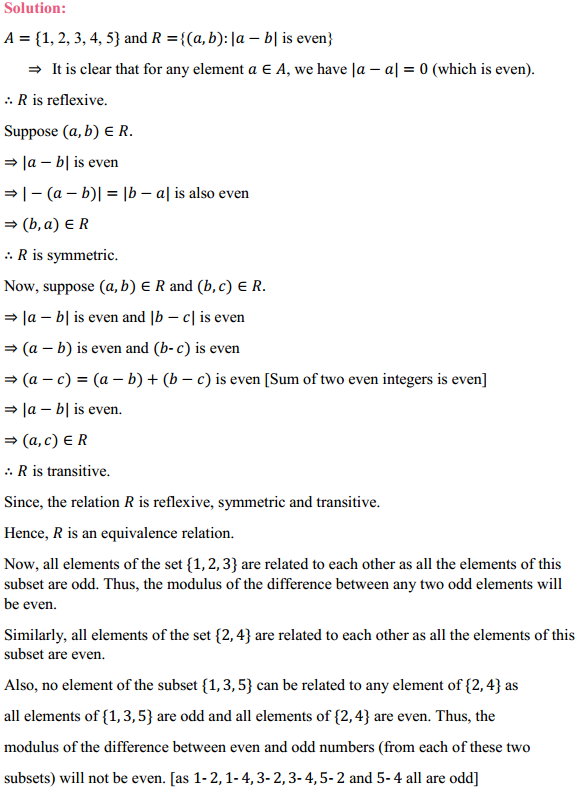
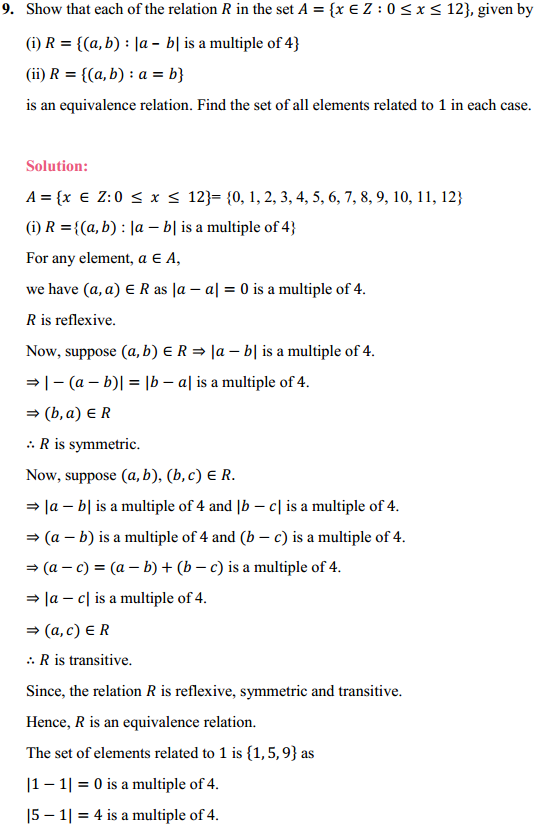
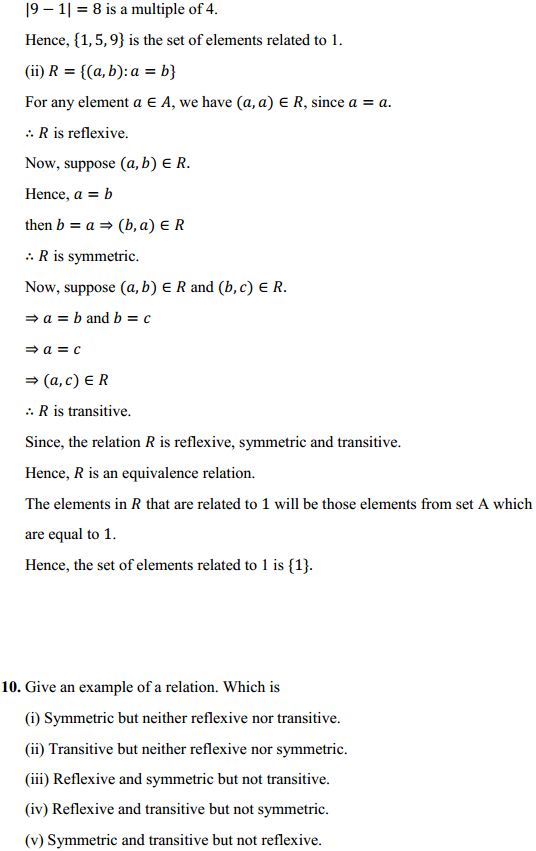
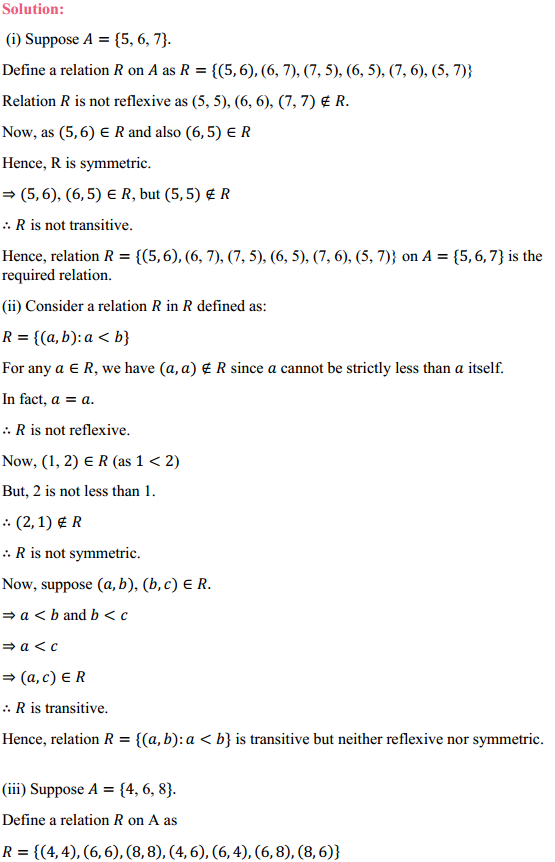
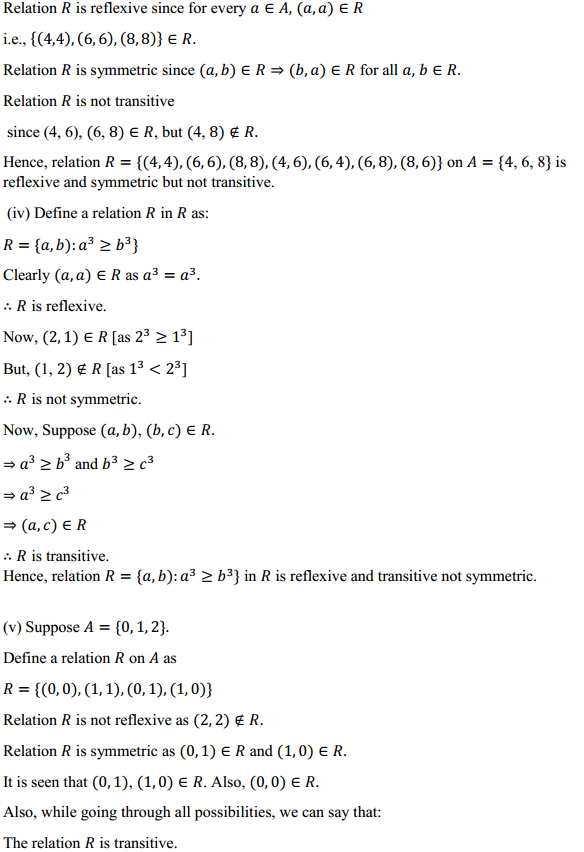
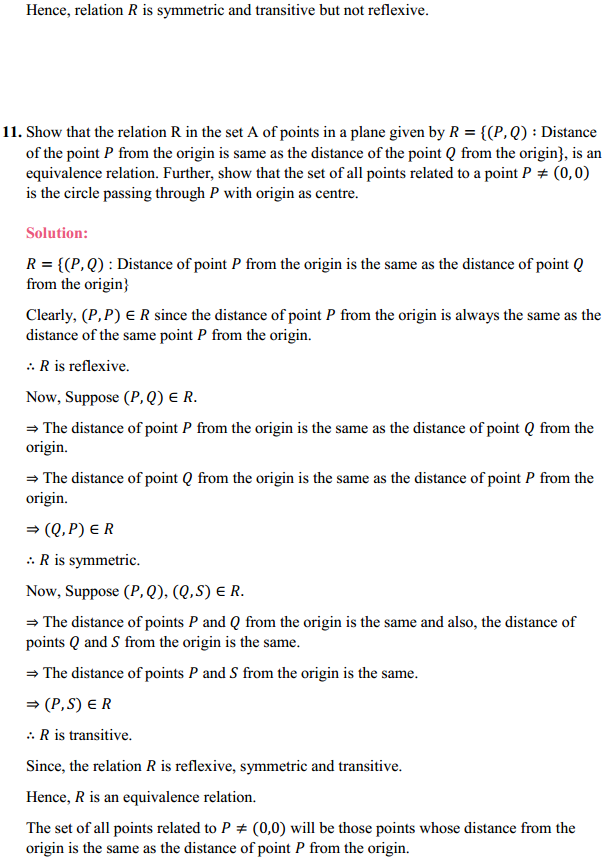
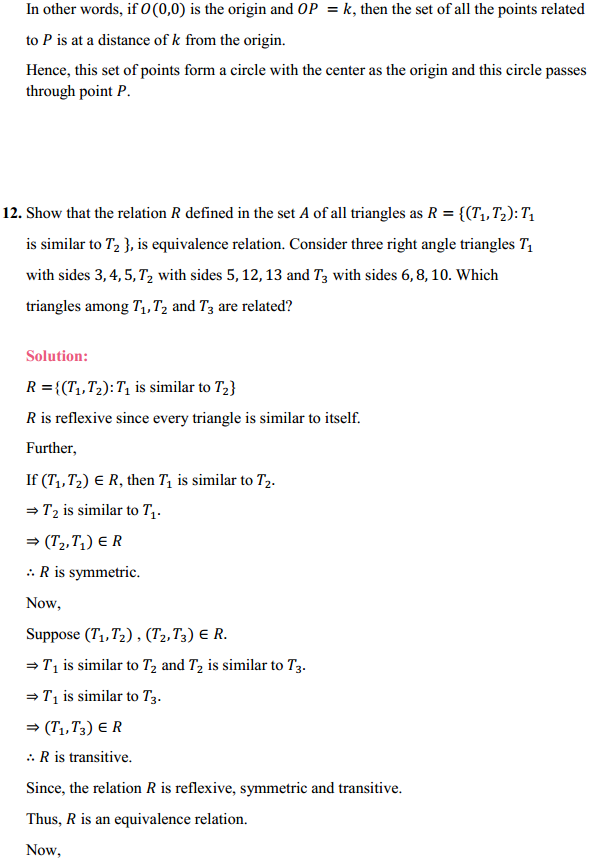
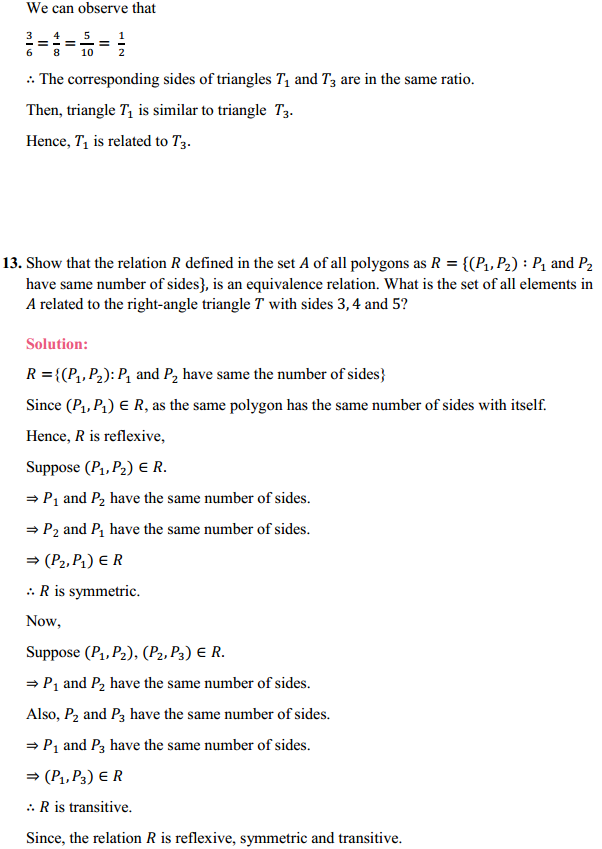
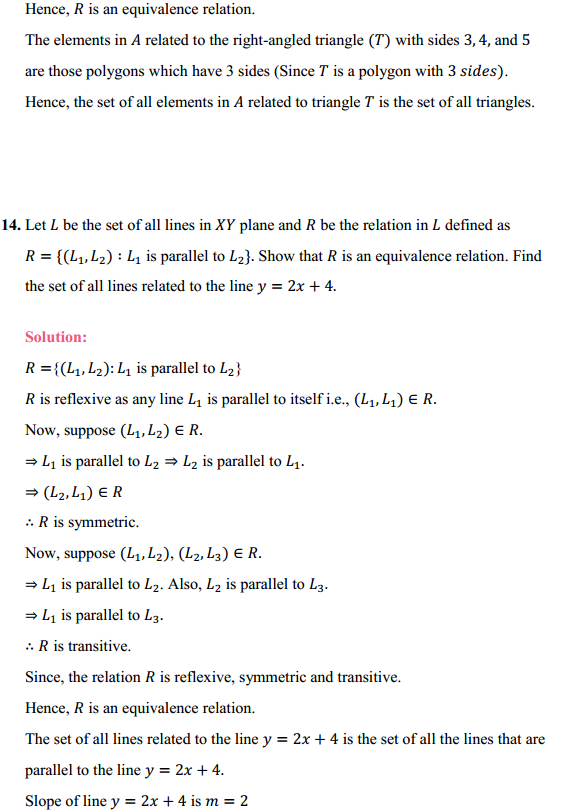
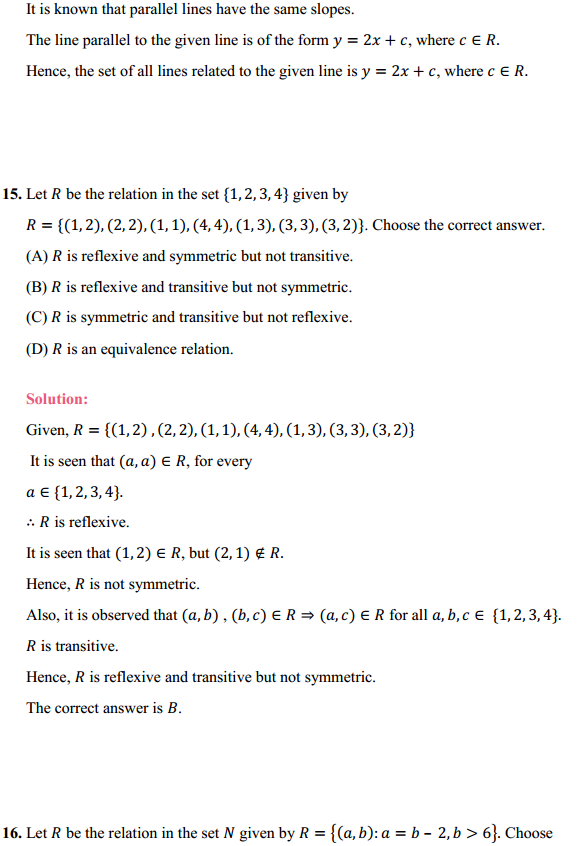
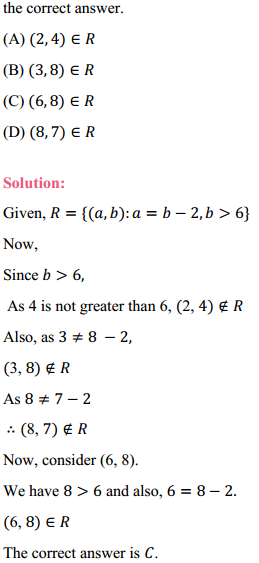
Here we are providing NCERT Solutions for Class 12 English Vistas Chapter 4 The Enemy. Students can get Class 12 English The Enemy NCERT Solutions, Questions and Answers designed by subject expert teachers.
The Enemy Reading with insight
Question 1.
There are moments in life when we have to make hard choices between our roles as private individuals and citizens with a sense of national loyalty. Discuss with reference to the story you have just read.
Answer:
A conflict of interest arises in a situation when someone in a position of trust, such as a doctor, has competing interests. Such competing interests can make it difficult to fulfil his or her duties impartially. A conflict of interest can create a situation of conflict, like in the story when a white American soldier falls into the hands of a Japanese physician, in enemy territory during the Second World War. The Japanese physician, Sadao, disliked the whites, and struggled with issues of loyalty, duty, and racism. As a Japanese national, it was his duty to hand over the escaped prisoner to the police, while as a doctor, it was his duty to save his life.
Sadao risked his safety and saved an enemy. He feared the consequences of harbouring an enemy. Subconsciously, he overcame his dislike for Americans and addressed the soldier as “my friend”. He, then, helped the soldier escape.
The character of Sadao can be aligned to that of a hero for his qualities of bravery, helpfulness, and professional competence. He, like a real hero, stood up for what he believed and cared less for repercussions. One definitely admires him for saving the soldier’s life like a true hero.
Question 2.
Dr Sadao was compelled by his duty as a doctor to help the enemy soldier. What made Hana, his wife, sympathetic to him in the face of open defiance from the domestic staff?
Answer:
When Sadao and Hana saw the prisoner of war, they were confronted with a dilemma, but the doctor in Sadao knew he had to save him. Hana, too, knew that if they left the American there, he would certainly die. She could not put him back in the sea. In the bedroom, Hana covered him with a flowered silk quilt and also washed him when Yumi refused. She also helped Sadao operate on the American. She was afraid lest the servants report them, yet she had the courage to assist her husband in saving the American’s life. When the soldier regained consciousness, he w as terrified, but Hana reassured him.
Hana’s pride and self-respect held her back even when her servants deserted her. The servants felt, that their master’s stay in America had tempered his attitude towards the Americans. Though Hana comes across as patriotic, advising her husband to give up the prisoner, her sympathy and humanity towards the wounded ‘enemy’ raises her beyond petty parochialism.
Question 3.
How would you explain the reluctance of the solider to leave the shelter of the doctor’s home even when he couldn’t stay there without risk to the doctor and to himself?
Answer:
As the American, Tom, recovered from his wound, he was weak and trusted Sadao to save his life. Though Sadao does not gracefully accept the gratitude the wounded soldier offered him, he was attentive as a doctor and eager for his patient to recover. However, Sadao was also concerned for his safety, and asked Tom to leave at his earliest. Though Sadao was momentarily tempted by the General’s offer to arrange for the prisoner to be secretly assassinated, the doctor showed unrest and finally arranged for the prisoner to escape.
Tom understood that he posed a risk to the doctor’s family and his own self, but he was reluctant to leave. He felt safe at the doctor’s and admitted that he was the finest Japanese he came across. Fear of arrest and death led him to seek shelter with Sadao and his family. In this story, Tom bonds with the Japanese family as fellow humans, who have looked after him, and looked up to them as his saviour. The mutual hatred, that their respective country festered in them, fell away at the time of crisis.
Question 4.
What explains the attitude of the ruthless General in the matter of the enemy soldier? Was it human consideration, lack of national loyalty, dereliction of duty, or simply self-absorption?
Answer:
The General was a highly self-absorbed man. He had kept the doctor in the country primarily because he needed medical attention. He decided to get rid of the soldier, quietly, to save the doctor from facing the consequences. When Sadao told him about the successful operation of the American, the General was happy because that was a reassurance of Sadao’s professional skill. His self-absorption came to the forefront when he wondered aloud what would happen if Sadao were condemned to death when he required his medical attention. He conspired to get the soldier killed by his private assassins, to ensure his own safety, rather than Sadao’s.
Later, when Sadao informed the General about Tom’s escape, a week after his emergency operation, the General admitted that he had promised to get him killed but during his suffering, he “thought of nothing but myself (himself), and forgot my (his) promise”. He was only concerned about if the matter was publicised and required assurance from the doctor that he would certify for his honesty.
Question 5.
While hatred against the enemy race is justifiable, especially during wartime, what makes a human being rise above narrow prejudices?
Answer:
Sadao had grown up believing that the Japanese were a superior race. He also disliked Americans as his own experience in America had not been pleasant. He had faced racial bias. He thought Americans were full of prejudice. Despite this, he couldn’t let the young American soldier bleed to death. While his logic and reasoning revolted against saving his ‘enemy’, his inherent humanity won over. Humanity and compassion often tide over hatred and prejudice.
Sadao was a fine example of how his patriotic and parochial attitude acted as a constant voice of conscience. He, however, was led by the superior feelings of compassion and humanity. As a doctor, he valued his promise to help any fellow human and he failed to compromise on his personal and professional ethics.
Question 6.
Do you think that the doctor’s final solution to the problem was the best possible one in the circumstances?
Answer:
Yes, it was.
OR
No, it wasn’t.
Question 7.
Does the story remind you of “Birth” by A J Cronin that you read in the Snapshots last year? What are the similarities?
Answer:
“The Enemy” is about an American-trained Japanese surgeon, working in Japan during Second World War, who saves an American POW first by operating on him and then by helping him escape. Sadao realized that the white man in the US navy uniform had a bullet wound. He was in a dilemma for a moment but the doctor in him took over and he treated the bullet wound and saved the soldier.
In “Birth”, A J Cronin deals with medical ethics through the protagonist, Andrew Manson. It brings out that medicine is not merely a business whose goal is to enrich its practitioners materially, the essence of being a doctor is the use of one’s senses, knowledge, and experience to reduce suffering and improve people’s lives. Manson overlooks the disappointment caused to him by his relationship, and seeks tremendous satisfaction in saving a mother and child.
Both the stories underline the medical ethics—a doctor’s responsibility to the patient is of the greatest importance. In light of this, both Sadao and Andrew are true to their profession and their duty as doctors.
The Enemy Short Answer Questions
Question 1.
What were Dr Sadao Hoki’s memories about his house?
Answer:
Dr Sadao Hoki had very pleasant memories about his house that was built on a spot in the Japanese coast. As a little boy he had often played on the beach. The low, square stone house was set upon rocks well above a narrow beach that was outlined with bent pines. As a boy Sadao had climbed the pines, supporting himself on his bare feet, as he had seen men do in the South Seas when they climbed for coconuts.
Question 2.
What was his father’s advice to Dr Sadao?
Answer:
Dr Sadao Hoki’s father had taken him often to the islands of those seas, and told him that the islands were the stepping stones to the future for Japan. The future was limitless and it depended on what one made it.
Question 3.
Why had Dr Sadao not been sent abroad with the troops?
Answer:
Sadao had become famous not only as a surgeon but as a scientist. He was kept back to tend to the old General, lest he needed an operation. Sadao was required to stay back in the capacity of a doctor.
Question 4.
Where had Dr Sadao first met his wife? What had been his initial reaction?
Answer:
Dr Sadao had met Hana, presently his wife, in America, at an American professor’s house. They were invited by the couple as foreign students. Sadao had waited before falling in love, until he was sure she was Japanese. His father would never have received her unless she proved to be a Japanese, pure of race.
Question 5.
How did Dr Sadao discover the American soldier?
Answer:
Standing on the porch of their house, Dr Sadao and his wife saw a man flung up, out of the ocean, by a breaker. He staggered a few steps, his body outlined against the mist. Sadao and Hana saw him on his hands and knees, crawling. Then they saw him fall on his face and lie there. It was only when they rushed to rescue him that they realized that he was an American.
Question 6.
What was Dr Sadao’s first reaction? What was the dilemma?
Answer:
Dr Sadao and his wife, Hana, thought of putting the injured soldier back in the sea; they were scared of being marked as someone who was sheltering an enemy. But they also realized that if they turned him over as a prisoner, he would certainly die. They stared at the stranger with repulsion, but eventually decided to carry him into the house.
Question 7.
How was the servants’ reaction different from that of Sadao?
Answer:
The two servants, employed by Sadao, were frightened. The old gardener, felt that his master should not shelter and treat a white man. Yumi also refused to wash a white man. The servants were defiant and made their displeasure evident. They even threatened to leave till their masters turned away the white man.
Question 8.
What was the American prisoner’s first reaction on regaining consciousness? How did Hana reassure him?
Answer:
When the wounded soldier awoke, he was weak, and his blue eyes were terrified when he perceived where he was. Hana felt compelled to apologize. She begged him not to be afraid. She knelt and fed him gently with the porcelain spoon. He ate unwillingly.
Question 9.
Why had the messenger in official uniform come to Sadao’s place? What was their reaction?
Answer:
The messenger had come to summon Dr Sadao as the old General was in pain. The Hokis were terrified as they wrongly guessed that they were being officially summoned for sheltering an American prisoner.
Question 10.
What was the General’s reaction to Sadao’s saving the enemy?
Answer:
The General was happy, much to Sadao’s surprise, as the General felt that his success at saving the prisoner made him all the more indispensable to himself. He felt the doctor could save anyone as he was extremely skilled. The self-centred General felt safe and reassured in Dr Sadao’s care.
Question 11.
What was the General’s plan to do away with the soldier?
Answer:
The General suggested that it would be best if he could be quietly killed, by someone who did not know him. For this, he planned to send his private assassins to the doctor’s house at night. He wanted the doctor to leave the outer partition of the white man’s room open, to provide an easy access to the soldier.
Question 12.
How did Sadao finally get rid of the prisoner?
Answer:
Sadao put the prisoner on a boat with food and extra clothing. He advised the prisoner to row to a little island not far from the coast. Nobody lived on it. He advised the American to lie low till he saw a Korean fishing boat pass by. Tom followed his instructions and Sadao was glad to see that his prisoner was gone within a few days of helping him escape to the island.
The Enemy Long Answer Question
Question 1.
Dr Sadao was a dutiful son who had not disappointed his father. Justify.
Answer:
When Sadao was a little boy, his father showed him the islands not far from the shore and told him that those islands were the “stepping-stones to the future of Japan”. Listening attentively to all that his father said, Sadao realized that his education was the most important thing in the world to his father. At twenty-two, he was sent to America to study surgery and medicine and he returned at thirty not only as a famous surgeon, but as an accomplished scientist. Since he was working on an important medical discovery, he was not sent abroad with the troops. The old General, too, trusted Sadao’s skill more than any other doctor. He had become a sought-after surgeon, thereby fulfilling his father’s wishes.
Question 2.
How did Sadao and Hana come across the American solider? How did they send him off?
Answer:
The American soldier came into the lives of the Japanese couple quite suddenly, one day. Sadao and Hana saw from their house, overlooking the beach, a man crawling out of the ocean, on his hands and knees who fell on his face and lay there. They rushed out to help him thinking it was a fisherman. It was only on coming closer that they saw the man was badly hurt. He had a gunshot wound and his clothes were wet rags. They turned his head and saw he was a white man whose gunshot wound had reopened. Looking at the “US Navy” insignia on his tattered uniform, they realized that he was a prisoner of war.
The “enemy’s” exit from the couple’s lives was equally dramatic. After Sadao confided in the General about the American in his house, the General said that he would send his private assassins to his house to kill the white man. Though Sadao waited for three nights, the assassins did not turn up. Unable to live in such tension, Sadao suggested to the American that he would put him in a boat at night, with food and extra clothes in it, and Tom could row it to the little island not far from the coast. This plan was executed and it was the last that Sadao and his family saw of him.
Question 3.
Describe Sadao and Hana’s chance meeting which turned into a very fruitful relationship.
Answer:
Sadao had met Hana by chance at the American professor’s house while both of them were students in America. Professor Harley and his wife had been kind people who wanted to do entertain their few foreign students. On one such occasion, Sadao had met Hana, a new student, there. They had not married, in haste, while in America. On the contrary, Sadao and Hana had waited for the completion of their studies and their love to mature. After finishing their studies, Sadao and Hana returned to Japan. After his father had seen her, and had realized that she too valued traditional Japanese values, the marriage was arranged in the old Japanese way, although Sadao and Hana had talked everything over before. They were perfectly happy and Sadao thought about how lucky he was that he had met her.
Question 4.
Why did the servants in Sadao’s family not approve of Sadao and Hana’s decisions?
Answer:
When Sadao and Hana got the wounded American home, they were apprehensive about the reaction of the servants. They decided to explain to the servants that they would hand the man to the police as soon as he recovered. The two servants were frightened hearing about the wounded American soldier. They felt that Sadao ought not to treat the wounds of a white man. The old gardener felt that the white man ought to die.
If he was saved; he would take revenge on them. When the American needed to be washed, Hana called Yumi for help she refused to wash a white man and Hana had to do it herself. Sadao operated on the man and saved his life. But the servants disapproved of their actions. They felt that since Hana and Sadao had been in America for a long time, they had forgotten to think of their own country first. They felt that the soldier should have been left to die. On the seventh day after the wounded soldier’s arrival, the servants left.
Question 5.
Why did the servants leave? Were they justified? Give reasons.
Answer:
The servants were frightened when they learnt about the white man’s presence in the house. They felt it was wrong for Sadao to heal the wounds of a white man. They could not understand when Sadao, who had been trained not to let a man die if he could help, agreed that Americans were their enemies, but treated him nevertheless. The old gardener felt that the white man ought to die. If he were saved; he would take revenge on them. Yumi refused to wash a white man. She was sad that Sadao and Hana did not think of their children who would suffer if their father was punished as a traitor. The cook said that it was Sadao’s pride in his skill that made him save the American soldier. As the days passed, the servants were as polite as ever, but their eyes were cold. But, on the seventh day, they left.
The servants were not justified because compassion and love are fundamental to all human beings. It was unethical to let a human die if he could be saved. The enemy should be first treated as a human. Man-made barriers like political enmity need not always translate into a personal one.
OR
Servants’ actions can be justified because harbouring an enemy is an offence or a crime. Unfettered by education, they simply followed the dictates of their society and country. They also feared for their lives, and their instinct of self-preservation made them unwillingly abandon the household.
Question 6.
Do you think the General was a self-centred man? Justify your answer.
Answer:
General was a self-centred man. In spite of a war, Sadao was kept in Japan to tend to the old General, lest he needed an operation. General Takima beat his wife cruelly but no one talked about that after he fought a victorious battle in Manchuria. Hana believed that if a man could be so cruel to a woman in his power, he would be worse to an enemy. When Sadao visited the General, he told him about the white man at his place. The General, instead of reacting furiously, felt reassured that Sadao could save anyone.
He wanted to save the . doctor more than ever as he might require his services. He suggested that he would send two of his private assassins to the doctor’s house at night. They would also take the soldier’s body away. However, no action was taken for three nights after that. On the fourth day, Sadao put Tom on a boat with provisions and told him to row to the island nearby. He later learnt that although the General had promised to send assassins, he had forgotten to send them in his anxiety about his own health.
Question 7.
Discuss Sadao’s feelings for the Americans.
Answer:
The wounded soldier brought back memories of his time in America. Sadao recalled the other white men he had known in America. He thought of the professor at whose house he had met Hana. He remembered his old teacher of anatomy and his fat landlady. He recalled how difficult it had been to find a place to live in America because he was a Japanese. The Americans were full of prejudice. It had been tough to live with such antagonistic feelings. As a Japanese, he had believed that he was superior to Americans.
He had hated the ignorant and dirty old woman who had agreed to rent him a room in her miserable house. She had taken care of him when he was sick. He had tried to be grateful to her but it proved difficult for him. He thought she was disgusting, even though she was kind to him. But then, white people were disgusting to Sadao. Then he remembered the young, tired face of his prisoner. It had been white and disgusting and he wondered why he could not kill him.
Question 8.
What was the dilemma that Sadao faced when he found the injured American soldier? How did he resolve it in “The Enemy”?
Answer:
The two main principles of medical ethics state “A physician shall, while caring for a patient, regard responsibility to the patient as paramount” and “A physician shall support access to medical care for all people”. In light of this, Sadao’s primary duty as a doctor was to help his patient without caring for his identity. He had to struggle between loyalty to his country and his training as a doctor to save a life. He instinctively chose the latter. Though rationality told him to hand over the prisoner to the police, humanitarian feelings and professional ethics made him act otherwise.
Sadao, who had grown up believing that the Japanese were a superior race, had not had a pleasant experience in America because he was a Japanese. The Americans were full of prejudices. He had found it tough to live with such feelings. Also, his socio-cultural values made it even more difficult for him to accept the Americans. But he could not let the young American soldier bleed to death. Neither could he kill him himself. While operating on him, he had called him “my friend” and had for the moment forgotten that he was his enemy. His instinctive sympathy to a suffering being conflicted with his duty as a loyal Japanese.
Question 9.
Discuss the message in Pearl S. Buck’s in “The Enemy”.
Answer:
Human beings have the ability to reason. However, thoughtful consideration is not always used in determining actions which are driven by motivation. What complicates the decision, at times, is how a person may have contradicting motives due to his internal conflicts.
Sadao, a Japanese surgeon, lived in Japan during the Second World War with his wife Hana and the servants. Earlier, he had spent several years in the United States during medical school where he had experienced cultural prejudice and bias first hand. He did have a few positive experiences including those with his teacher and landlady, but most Americans had not welcomed him.
Despite this, he put his life in jeopardy to save an American prisoner of war. Pearl S. Buck shows how humanitarian considerations override man-made barriers of rationality and culture. Man’s affinity, despite cultural prejudices, is instinctive.
Question 10.
There are moments in life when we have to make hard choices between our roles as private individuals and as citizens with a sense of national loyalty. Discuss with reference to the story you have just read.
Answer:
Sometimes a conflict of interest between duty and loyalty can create an appearance of impropriety. A white American soldier falls into the hands of a Japanese physician during World War II in enemy territory. The Japanese physician, Sadao, who dislikes whites struggles with issues of loyalty, duty, wartime medicine and racism.
However, Sadao risks his safety and saves the enemy. Although he fears the consequences for harbouring an enemy, he addresses the soldier as “my friend” after successfully saving him. Once the American soldier recovers, Sadao helps him escape. While Sadao does not come across as a “nationalist”, he can be viewed as a hero for his qualities such as bravery, helpfulness, and professional competence. Like a real hero . he stands up for what he believes in, and does not restrict himself for fear of repercussions. He is admirable for saving the American soldier’s life.
Here we are providing NCERT Solutions for Class 12 English Vistas Chapter 6 On the face of It. Students can get Class 12 English On the face of It NCERT Solutions, Questions and Answers designed by subject expert teachers.
On the face of It Reading with insight
Question 1.
What is it that draws Derry towards Mr Lamb in spite of himself?
Answer:
Derry met Mr Lamb by chance. As he walked into Mr Lamb’s garden, his apprehensions were put to rest by the sensitive counselling he received. Derry, as a young boy with a burnt face, was subjected to alienation and pity.People felt that his face was “a terrible thing” and shunned him. Mr Lamb taught him how beauty was relative and individuality of each creation was to be treasured. He taught Derry to view things differently and taught him to embrace his flaw. He told Derry’ of a man who was afraid of everything and who shut himself up in a room, till a picture fell off the wall onto his head and killed him.
He told him not to hide behind his deformity. He gave Derry the conviction to achieve what he wanted out of life. Derry learnt to let go of his hatred that was eating him up from inside. When Derry defended Mr Lamb to his mother, he seemed to be overwhelmed and inspired by Mr Lamb’s ideas. He found in Mr Lamb someone who looked beyond his deformity and did not pity or fear him. Mr Lamb attracted Derry because he taught him the valuable lesson of not indulging in self-pity and of looking at the brighter side of things. He taught Derry, by his own example, to be unafraid and to face the world.
Question 2.
In which section of the play does Mr Lamb display signs of loneliness and disappointment? What are the ways in which Mr Lamb tries to overcome these feelings?
Answer:
Mr Lamb comes across as a lonely, but cheerful figure who wards off his loneliness by finding diversion in nature around him. He appears to be caught up in his own world—his garden. His leg was blown off years back and the kids called him “Lamey-Lamb” but he had learnt not to let that bother him. He lived alone in his house and spent his time watching, listening, and thinking. When Mr Lamb told Derry that he had lot of friends, Derry suspected him of lying and declared that he would probably die alone, unattended. Mr Lamb found solace in his bees and crab apples. When Derry talked of going back home, he wistfully remarked, “Once you get home, you’d never let yourself come back.”
He made an effort to befriend people, leaving the door open, and the window curtain-less. Mr Lamb tried to overcome his loneliness and did not seem overwhelmed by the same. He sat in the garden and listened to his bees singing and sat in the sun and read books. Unlike Derry, he complained little about being isolated, he found company in nature around him, content to marvel at their beauty, and the occasional visitors.
Question 3.
The actual pain or the inconvenience caused by a physical impairment is often less than the sense of alienation felt by the person with a disability. What is the kind of behaviour that the person expects from others?
Answer:
The right word for ‘physical impairment’ is ‘differently-abled’—a word framed to view people in a more sensitive manner. But, it is cruel that over 90 million physically-challenged children worldwide, of whom 36 million are in India,are being systemically excluded from mainstream education. Many of them are stereotyped frequently and also face alienation even within their own families.
They deserve to be understood and accepted as productive and effective citizens. Issues of physical accessibility are just the tip of the iceberg. Instead of questioning the need for civil rights for people with disabilities, we must question a society in which these rights are not the norm. The most important thing we can do is value the voice of the people with disabilities. History is fraught with well-meaning individuals who truly desired to assist people with disabilities, but in their haste to help, they neglected to empower these people to be their own advocates. We must allow people with disabilities to become the subjects rather than the objects of their own history.
Each of us must continually question our own presumptions and attitudes. We must be willing to give people with disabilities their rightful place at the conversation table and be willing to listen to their truth. Ostracising or offering them pity pushes them back to darkness. We should strive to bring them to light.
Question 4.
Will Derry get back to his seclusion or will Mr Lamb’s brief association effect a change in the kind of life he will lead in future?
Answer:
When Derry met Mr Lamb, he suffered from a deep-rooted complex and felt he had “the ugliest face”. Subjected to insensitive remarks and alienated from the natural course of life, he came to view himself as a hideous monster to be kept away from human company. Mr Lamb, in his sensitive dealings, almost healed Derry. He liberated him from his misery.
Mr Lamb exposed him to a new world where one’s physical attributes did not matter. He respected each creation’s individuality. He taught Derry beauty was relative, and inspired him to achieve what he wished for, in spite of his disability. The brief meeting left an indelible imprint on Derry’s young mind. For the first time Derry felt comfortable with himself.
He told his mother that he did not care what he looked like. He had learnt to accept himself. Though Derry returned to find Mr Lamb dead, he was unlikely to retreat into his cocoon of isolation. This encounter between them seemed to have a purpose of passing on Mr Lamb’s wisdom and sensitivity to Derry’s young understanding. He would most certainly carry on with Mr Lamb’s advice and inspiration.
On the face of It Short Answer Questions
Question 1.
What is the setting of the play?
Answer:
The setting of the play is Mr Lamb’s garden where there is the occasional sound of birdsong and of tree leaves rustling. Derry had jumped over the wall and walked slowly and tentatively through the long grass. He came round to a screen of bushes, where he encountered Mr Lamb, the owner of the house.
Question 2.
“I’m not afraid. People are afraid of me.” Why did Derry say this?
Answer:
Derry was made to feel isolated as people shunned him and kept away from him. He felt that since he had a scarred face, “a terrible thing”, people feared him. He admitted to being afraid and repulsed of his own self when he looked at himself in the mirror.
Question 3.
What did Derry feel about his face? Why?
Answer:
Derry told Lamb that his face had been burnt by acid. The acid ate his face and consequently ate away at his life. He felt “it won’t ever be any different”. He felt so because he has been shabbily treated by people around him. Even his family viewed him differently, with pity.
Question 4.
How did Mr Lamb react to Derry viewing himself differently?
Answer:
Mr Lamb explained to him that external appearance was inconsequential. He taught him to disregard accepted notions of beauty. A weed was considered redundant by everyone, but to Mr Lamb, weeds were a thing of beauty. He drew on the example to make Derry understand that beauty had alternate meanings.
Question 5.
How had Mr Lamb lost his leg? What was people’s reaction to it?
Answer:
One of Mr Lamb’s legs had been blown off, years back, when he was at war. People called him “Lamey- Lamb”. He admitted that it did not bother him anymore.
Question 6.
Why did Derry feel he was unlike the beast in the story ‘Beauty and the Beast’?
Answer:
Derry admitted that he had often been consoled by people who cited the example of the Beast, who was loved by Beauty in spite of his physical appearance. However, Derry received little consolation from the example of the Beast who was changed to a handsome prince following Beauty’s kiss. Derry regretted that he would have to live with his damaged face forever.
Question 7.
Narrate the example of the man who was afraid of everything, as narrated by Mr Lamb.
Answer:
Mr Lamb said there was a man—afraid of everything. He locked himself up in a room and never left it. He was afraid that a bus might run him over, or a man might breathe deadly germs onto him, or a donkey might kick him to death, or lightning might strike him down, or he might love a girl and the girl might leave him, or he might slip on a banana skin and fall. He locked himself up in his room and stayed there, till a picture fell off the wall on his head and killed him.
Question 8.
What was Lamb’s advice to Derry about “hating people”?
Answer:
When Derry said that he hated some people, Mr Lamb told him hating people did more harm than any bottle of acid. Whereas, acid only burnt his face, hating could bum him from inside.
Question 9.
What was Derry’s mother’s reaction to his meeting with Lamb?
Answer:
Derry’s mother was apprehensive of Mr Lamb, influenced as she was by what people thought of him. She had been warned by people to keep away from Mr Lamb. She stopped Derry from going back to Mr Lamb’s. But Derry was determined. He wanted to go back there and listen to things that mattered, things nobody else had ever said to him.
On the face of It Long Answer Questions
Question 1.
“Acid.. .ate my face up. It ate me up.” Describe the miseries suffered by Derry after the unfortunate incident he refers to.
Answer:
Derry’s face was badly scarred as he got burned with acid. He was deeply wounded by people’s behaviour.
He felt that though people pretended to be sympathetic, they were afraid of him because he had the ugliest face. Derry recalled how a woman had said that his face was “a terrible thing” and was “a face only a mother could love”. He had heard lots of things that were as hurtful. Moreover, he did not like people staring at him or being afraid of him. He remembered how only his mother had once kissed him, and that too, on the other side of his face. He felt that she too did it out of pity.
He had heard his parents wonder about what would happen to him when they died as it would be difficult for him to get on in the world with a face like his. He had heard a person say that people were better off with others like themselves, for example, blind people only ought to be with other blind people and idiot boys with idiot boys. Derry, too, preferred such a situation because people would then not stare at him. The attitude of people towards Derry reflects the callousness of the society towards the physically impaired.
Question 2.
Mr Lamb also displays signs of loneliness and disappointments. What are these? What are the ways in which Mr Lamb tries to overcome these feelings?
Answer:
Mr Lamb was called “Lamey-Lamb” as his leg was blown off years back in a bomb attack and he had a tin leg. He was very lonely and longed for company as he lived alone in his house. He welcomed Derry into his garden and tried to put his fears to rest. When Derry noticed that there were no curtains at the windows and inquired about it, Mr Lamb told him that it was so because he neither liked shutting things out, nor shutting them in, implying his openness of mind. He liked the light and the darkness, and also wanted to hear the wind.
These views were a manifestation of Mr Lamb’s desires. He wanted hundreds of friends to visit his house. This was also evident from the fact that he always left the gate open. He visualized people coming in and sitting in front of the fire in winter and kids coming for the apples and pears and for toffee that he made with honey. Mr Lamb felt that people “are never just nothing”. Like the open windows, Mr Lamb was always “waiting, watching and listening”.
Question 3.
How were Derry’s and Mr Lamb’s views different?
Answer:
Both Derry and Mr Lamb had a physical handicap. Derry had a face that was half burnt with acid while Mr Lamb’s leg had been blown off and had been replaced with a tin leg. That was where the similarity ended. Derry’s burnt face had scarred his soul. He was withdrawn and felt that people were afraid of him because he had the ugliest face. He felt that people pretended to be sympathetic when actually they were repulsed. They either ignored him or gave him curious looks, glances and questions. He feels awkward and abnormal.
He did not even like his mother to kiss him because she kissed the other side of his face and he felt she did so as she had to. This sense of isolation is heightened by the overprotective attitude of his mother, who tried to keep him isolated to protect him from getting hurt. As a result, he had no true friends. Derry believed that people such as him are better off with others like themselves to avoid being stared at.
On the other hand, Mr Lamb said that beauty was relative and he enjoyed everything God had made—even the weeds in the garden and the bees singing. He respected each creation’s individuality. He said that the world was as one looked at it. He did not care about physical attributes and said they were not important.
He felt that Derry had arms, legs, eyes, ears, tongue and a brain. He could get with his life, like everyone, or even better. He also said that hating people would do him more harm than any bottle of acid. It would burn away his inside. He clarified to Derry that people with the same deformity were also different. It was incorrect to judge people by what they looked like. One had to watch, listen, and think to notice the differences. Though Mr Lamb led a lonely life, he liked to think that the people who entered his garden were his friends. He avoided thinking of his isolation and tried to invite company by keeping the gate to his house open.
Question 4.
A positive attitude helps to tackle all difficulties in life. Elaborate with reference to Mr Lamb in the play “On the Face of It”.
Answer:
People with physical handicaps are aware of the fact that they are physically different from most others and that there are certain things they cannot do. They have poor self-esteem. They feel victimized, and fall into a vicious cycle of morbid sadness and intense anger at the world. They constantly feel that “nobody loves me or cares”. Being stigmatized worsens it.
In the story, we see Derry’s feeling of dejection after being treated with fear and horror. Derry finally leams to face his disability with courage only when Mr Lamb encourages him to have a positive attitude. This positive attitude makes one understanding, friendly towards life and people, provides confidence and ability to face the hardships of life and realize one’s potential. As a result, Derry, who has avoided company and has been afraid to meet people, decides to go to Mr Lamb’s house and meet him. He no longer wants to live in isolation.